#but instead she becomes our more objective point of comparison
Explore tagged Tumblr posts
Text
Never over Will vs Angela's POV of Mike and El btw


#unreliable narration#stranger things#will byers unreliable narrator#byler#anti milkvan#the way will idolizes their relationship#and yeah angel hates el and thinks mike is ugly but has no reason to believe they're unhappy#if anything she should like will be unhappy that they ARE happy#but unlike will want to ruin it#but instead she becomes our more objective point of comparison#jealousy as the biased and somehow hatred as the reference point
62 notes
·
View notes
Text
TWST Analysis: Malleus/Aurora Parallels
In one of my previous posts on TWST, I explained my thoughts on how our leading bad boys had heavy parallels with the heroes of the Disney films through their personalities. Unfortunately, at the time, I couldn't cover Malleus well since Book 7 had yet to release. I still don't feel like I can in-full since the Book isn't finished; however, I have noticed a couple of new things that only add to my previous explanation on how he paralleled Aurora. While this is a shorter post, to avoid spoilers for the Japanese release, I will continue below the cut:
So there's two things I want to add so far with what chapters have been available to us: Malleus' feelings of isolation and, later on, his feelings of the small world around him collapsing. I'll mention Silver as well for comparison, because he too has several clear Aurora parallels. Silver talks to animals, he's an ethereal beauty, and--obviously--his sleeping habits. As explained in one of the Halloween events, he also grew up in the woods and was left by himself at times by Lilia. However, despite this, Silver found himself in ready company and was comfortable in the cottage he called home. He quickly made friends with forest creatures, he had Lilia, and he would later have Malleus and Sebek. Malleus though...
Malleus may have had some of that growing up, but there was always a distance established right from his birth due to his status as a prince and insane strength as a mage. Silver and Sebek are his friends, but they also work for him. They greatly respect him, but it's to the point that they won't treat him on an equal level as they do each other. (This can also parallel how the three fairies raised Aurora, but ultimately weren't her family, instead serving her and her parents as royalty. They lied to Aurora to keep her safe, pushing her to take up her duty as princess when she'd barely learned she was one.) He's set on a pedestal high above and far away from everyone else. That's his cottage in the woods.
Because of this, like Aurora, we find Malleus responding to his loneliness by becoming something of a wanderer. Aurora explored the forest near her home, daydreaming of finding love in someone she would "walk together and talk together" with. Malleus wanders the campus grounds for places that feel lost to time, like Ramshackle Dorm, like how he himself feels due to his long lifespan as a fae. Then, also like Aurora, he eventually happens upon someone he's been waiting for for so long during one of these walks. Aurora met her prince, her true love. Malleus met Yuu, a friend who will accept him as a person rather than an object of power or fear.
Now for the second part: The feeling of the world collapsing around him. To recap on things I've covered before with her character, in Aurora's case, she lost her sense of identity and freedom. She grew up believing she was a commoner girl who could one day fall in love with whoever she pleased... only to go home the same day she meets someone she likes and be told she's a lost princess who has to abandon everything she's ever known to get hitched to a total stranger. For Malleus, he finally finds a friend in Yuu and feels comfortable with his life as a student... and it's all ending in a blink of an eye to him. Lilia is leaving him, possibly even dying, as far as he knows. Yuu is trying to leave to go back to their own world. Even without those two issues, he's still a junior and the year is ending: Even though he technically has one more year of school to go, at least half of it will be spent away from Night Raven College, as is the case with all of its seniors. The good times are ending. Everyone is going away. Malleus is being thrown back into that isolated state that he was so miserable in before.
46 notes
·
View notes
Text
So About Ben 10: Alien Force
Story: Moving our heroes off the road and out of the rust bucket and into their hometown of Bellwood is a welcome change that could allow us to see different facets of our protagonists which informs the story as a whole. Having Ben and Gwen search for their now missing grandfather only for them to stumble upon a conspiracy by aliens known as the Highbreed to take over the earth was a premise rife with potential. Getting to see Ben and Gwen operate independently of Grandpa Max especially considering they're nowhere near as knowledgable about this world as him is brilliant. Incorporating Kevin to be a resource isn't bad but INCREDIBLY RUSHED. Him begrudgingly helping them on occasion would've been more sensible for the characters and the story instead of him coming to their aid consistently. How are we supposed to feel the loss of their grandpa Max while they navigate this alien world if Kevin immediately fills that void? What was the point of making Ben step into the role of leadership for his grandpa max to just come back anyway? Speaking of Grandpa Max they barely react to his alleged death throughout this series and Ben and Gwen's collective grief isn't even fully explored. The trio's personal lives are never given any real screen time and when it is it's far too late in the series. When Kevin isn't working on his car where does he sleep, is it in his garage? I'm not saying we need long drawn out answers to some of these questions but a throwaway line here and there or multiple episodes dedicated to these topics and questions would show that the writers are putting some actual forethought into this story. Another stray thought since the DNAliens are revealed to be humans that have been enslaved by the Highbreed we should've seen our heroes struggle with that either in combat or just from a moral standpoint. It should've realistically caused some conflict amongst the trio about how to proceed and how to properly restrain themselves going forward. Would've been a useful way to show other aspects of their personalities and upbringings. While the transition from the episodic nature of the original to serialized storytelling in the sequel is to be applauded the new ideas presented have promise but poor execution overall.
Characters & Combat: Ben is no longer cocky and impulsive, instead he sports a newfound maturity that can only be rivaled by someone in their 50s. This development completely guts him of any potential for character development. Another progression in his character that I just didn't care for was his over reliance on the omnitrix, since it doesn't time out as quickly as it used to it has become a crutch for him. We no longer see his creative mind at work when posed with an alien threat and 'going hero' is no longer an option. In the second episode of classic we see Ben takedown a mutant hamster with nothing but his wit athleticism and a motorized scooter. Gwen is no better she was my favorite in classic and is utterly unrecognizable to me now. Known for being a feisty sarcastic fiercely intelligent character whose interests in science history and tech made her useful not only as a foil to Ben to show her level of competence in comparison, but as an ally when providing him with advice on what transformation to take on for whatever problem they were facing at the time. Not to mention her background in martial arts helped her and Ben deal with less powerful enemies and her latent talent for magic after encountering Hex Charmcaster the charms of Bezel along with obtaining a spell book made her a more active combatant. In Alien Force her abilities as well as personality are flattened. Instead of casting spells to create mini tornadoes cause water spouts manifest mist levitate objects and project shields that deflect laser fire they make her into a great value green lantern. When it comes to combat she's weaker now than when she was a child, the power of her shields are inconsistent her energy discs don't do the same amount of damage as Ben and Kevin's attacks. On top of that they decided the origin of her power is alien via her grandmother. She's no longer a uniquely magical girl whose powers act as a vehicle to bring fantasy elements into this sci-fi story but another generic alien. In this show they just reduced her to the token girl which will never sit right with me. Kevin is back and no longer as murderous as he used to be when Ben and Gwen came across him when they were kids. Instead Kevin is now pushing alien tech as a dealer, weapons specifically. This isn't a horrible progression considering Kevin was a street rat and unhoused in classic plus his stint in the null void it actually makes some semblance of sense. What doesn't make sense is his willingness to help, he's a consistently selfish person so aiding Ben and Gwen happened too quick. They should've had Ben and Gwen coaxing him into helping with their mission either through providing him with whatever alien tech Grandpa Max had laying around or trading in information he'd find beneficial. His crush on Gwen was also completely out of left field the same goes for their romance which was as rushed as it was forced. If there was a buildup to it all.
Art & Character Design: The backgrounds and character design are now as flat and lifeless as Ben and Gwen's personalities. A majority of the episodes always take place at night leaving everything shrouded in a perpetual darkness that rivals the shadow realm of Yu-Gi-Oh. Character design is quite poor when you consider the leads can only make about two expressions leaving them unable to properly emote or show the full range of human emotion. Thankfully, this doesn't extend to Ben's aliens they're quite expressive too bad they're just poor knockoffs of the originals and when they aren't knockoffs they're just hybrids of the originals. Swampfire is just Heatblast merged with Wildvine, Big Chill is just Ghostfreak with cryokinesis. Chromastone is Diamondhead but he can absorb and redirect energy while Echo Echo is just Ditto with the addition of a sonic scream. Gone is the excitement and innovation that comes with a new transformation because they're just a half assed combo of what we've seen already. Actually, I take that back there are a few notable exceptions, Spidermonkey was a great addition with a great design and unique I'd even argue the same for Goop because he provides something different and is reminiscent of an alien species we saw in classic in the movie Ben 10: Secret of the Omnitrix. Most of these new transformations invalidate the originals and are too OP with no clear limits. They don't even look as alien monstrous grotesque or dynamic as you'd expect given the standard set by classic. Ben's design is fine but his fit is so generic, plain black tee paired with a green jacket that has the number ten on it and blue jeans. The simplicity of his clothes does suit his now rigid persona tho. Gwen is the worst offender sporting a white button up with a blue sweater with a black skirt stockings and short heels. It's been made apparent in classic that she loves fashion so relegating her to a school uniform seems not only out of character but completely fucking ridiculous. How did these two have more style and flair at 10 than they do at 15?
5 notes
·
View notes
Note
please drop the essay length analysis Judas and Jesus (extra gay Swedish edition), O great and knowledgeable monarch of our times
alright, you ask i deliver! please excuse any typos, my eyes aren't exactly working rn
welcome to my probably super subjective but correct analysis, aka
Judas Was Right and Jesus Was A Victim (At Least, In Swedish)
Before we get started, a couple points: i’ll try to avoid comparisons to other specific productions, i’ve only seen the other recorded 2012 british version which i didn’t like for reasons including but not limited to the amount of white people with dreadlocks. Also, my understanding of swedish is limited to a couple words and phrases, so most of the lyrics i reference will be english subtitles from Ola Salo’s swedish translation and therefore might not be the most accurate !
There’s so much i could cover in this, but for now i’m going to focus on how jesus and judas are portrayed in the 2014 swedish arena tour of Jesus Christ Superstar (JCS) starring Ola Salo as Jesus and Peter Johansson as Judas, along with how this production more implicitly views god.
From the opening number, translated into swedish as En Dimmig Himmelsdröm (A Foggy Heaven’s Dream), Peter Johansson’s acting and semantic differences in the lyrics present us with a deeply sympathetic portrayal of Judas. Looking purely at language, the english equivalent Heaven On Their Minds instantly paints Judas as much more of a faithless doubter- lyrics exclusive to the english version like “all your followers have gone blind / too much heaven on their minds” and “they think you’re the new messiah / and they’ll hurt you when they find they’re wrong” strongly enforce Judas’ main motivation for his actions being that he has less belief in Jesus and God’s plan than any of the other disciples with strong statements judging the other disciples for following him and claiming that Jesus ISN’T the messiah. The swedish translation doesn’t paint exactly the same picture- the focus of Judas’ number becomes his fear for Jesus’ wellbeing, not because he isn’t the messiah (the production remains fairly ambiguous on this point), but because Jesus can’t cope. The root of Judas’ concern comes from fear for Jesus’ wellbeing, and the disciples are referenced as regularly misunderstanding and wilfully twisting Jesus’ words. The swedish equivalent lyrics for the above examples are “they say, “jesus is god’s son” / but you know how people can change” (judas isn’t concerned with truth, just the danger that jesus will be in if the tide turns), and “the kingdom of heaven is within us, that’s what you said / bu they sew it, stitch by stich into some kind of foggy heaven’s dream”. Judas is showing that he HAS been listening and cares for Jesus’ teachings, but ‘they’ [his disciples] are turning them into something else entirely, and Judas’ worries that the support of the masses is fragile at best- the lines “and everything you say gets twisted by your lackeys / it will be anything but what you’ve said” and “you are being used by people who want you in their battle” reinforces this again. When combined with Peter Johansson’s tough but tender performance, in which he dances between disdain for Jesus, the institution, and affection for Jesus, the man (an important distinction), Judas is the harsh realist doing his best to look out for the man he loves. The way he takes Jesus hands and looks at him with love and urgency straight away establishes that his motivations are pure- Judas is doing what he thinks is best, even though it feels like no one will listen to him.
That was long, but En Dimmig Himmelsdröm is the perfect character introduction for Judas. He’s not totally unrecognisable, still delivering digs about ‘Jesus, the little carpenter’s son’, his manner is still rough and at this point we’re not sure whether or not the claims he makes about the disciples have any truth to them, BUT we can also see how much Jesus means to him, an important point that give context to the intensity of their future arguments and really makes the whole story much more heartbreaking.
This brings me to Ola Salo’s Jesus. Delightfully camp and queercoded, Judas describes him as being caught up in his own magic and mystery and buckling under the pressure, and he’s not entirely wrong. Throughout the first act, Jesus basks in the luxuries that being messiah can give him (the oils Mary paid for using disciple funds that were supposed to go towards helping the poor, him absolutely thriving in the shopping cart in What’s the Buzz?), and is shown actively avoiding any reminders of the seriousness of his position. He’s sick of the disciples asking him for a plan, he chooses the comforting Mary, who’s theme consists of telling Jesus everything is okay and he doesn’t need to think about anything, over Judas, who is less perhaps ‘cosy’ but is actively trying to warn and protect Jesus from an awful fate. During The Temple, he starts to crack as he’s overcome by the followers begging him to make him well, fear in his eyes as he raises his arms while frozen on the spot trying to avoid being devoured by the frenzy in desperate need of a messiah. Judas’ point about Jesus buckling under the pressure is starting to look more and more reasonable, and the dashes of showbiz campness add to the sense that much of Jesus is a persona constructed for the masses to give himself enough distance to prevent him from being crushed by the weight of God entirely. Jesus, the institution, prances around, lays his hands on his followers, and projects an air of easygoing calm. Jesus, the man, is scared and alone, and Jesus, the man, really comes out in Last Supper, but before we get there, I want to circle back to the Jesus/Mary/Judas thing.
Jesus, Mary, and Judas are presented as a love triangle: so much so, that Judas seeing Mary sing of her love for Jesus (I Don’t Know How To Love Him) is actually played as the inciting incident that sends him to the pharisees. Judas, the picture of the jealous lover, storms onto the scene, breaking them up and attempting to kiss Jesus, who instead shoves him to the ground in disdain. Judas, who is perhaps a little controlling, realises that any influence he had over Jesus has gone, and it’s likely a combination of jealousy and the knowledge that Jesus won’t stop that prompts him to head to the pharisees. In his meeting with the pharisees (known in english as Damned For All Time, although that phrase doesn’t appear once in the swedish), Judas’ expresses outright that “I’m the one who sees / Jesus, he can’t handle it anymore” “the truth is that this hysteria is making him lose control”, once he can get past explaining how much this plan of action feels like a last resort. He never even verbally or physically accept the pharisees’ offer of money, he denies it twice before it is eventually thrown over him after he reluctantly gives them the date and time to find Jesus- we never even see him pick it up, unlike other productions which show Judas grabbing for the cash and place a higher emphasis on Judas making sure he ‘won’t be damned for all time’, painting Judas as far more self serving. When it comes to Jesus, Judas is active- he’s running around trying to help, caressing him, embracing him, grabbing his hand, kissing him. They share countless moment of intimacy, especially at the start, establishing the fondness between them instead of instantly jumping to their conflict. When it comes to Mary (and admittedly, this is partially because she’s a secondary character- don’t get me wrong I still love her and Gunilla Backman does a brilliant job), she’s much more passive. Other than the much more gentle kisses in I Don’t Know How To Love Him and her penchant for dabbing Jesus’ forehead, she’s mostly just ‘there’. She cares for Jesus after the fact, and even when performing acts of intimacy like the oil and the kiss, she maintains a lot of physical distance- her songs touch on this as, much like Jesus (admittedly for different reasons), she actively distances herself from feelings to protect herself, so naturally she literally places distance between herself and the object of her love.
This brings me back to Last Supper, Gethsemane ( I Only Want to Say), and the kiss of death that broke all of our hearts. Throughout this segment, this is when Jesus, the man, really comes through, and it’s devastating. In Last Supper, he properly expresses the sheer amount of loneliness he feels, reiterating how he feels everyone will forget about him once he’s gone, and doesn’t really care about him as a man (”for you, my blood is not worth more than wine / for you, my body is not worth more than bread” “you will have forgotten me as soon as i give up my life”). This devolves into the disciples fighting each other and, you guessed it, ignoring him. For the first time, Jesus meaningfully lets out his anger, and as it turns to Judas, Judas does the same. Because of the set up of their complicated romantic relationship and the stakes involved, the amount of personal attacks and anger that comes out of Jesus and Judas’ repeated fights (which get physical) make complete sense- Jesus’ frustrations come from the fact that his entire fate has been predetermined and to him, Judas is just another instrument in the ways he’s been controlled (both with Judas being his betrayer, but also the way that Judas’ constant advice and interference with Jesus’ life (most obviously, the mary thing) are acted by Ola Salo as becoming increasingly frustrating to Jesus)- these frustrations are directed at their real cause, God, in Gethsemane. Judas’ frustrations come from the fact that no matter how hard he tries to help Jesus and keep him safe, Jesus keeps rejecting his efforts resulting in “all that we’ve built up [being] destroyed”- Judas’ heart hasn’t just been broken by Jesus rejecting him romantically, but on every level. Here, he’s actually shown to be the disciple most passionate about helping people practically and long term, being the only one concerned about Mary taking money which was supposed to help people, manipulated by the pharisees with the promise of doing good for the masses, and criticising Jesus for how they could be doing so much for people, ending his part of Last Supper with “every time i look at you i ask myself why you let all your things go so wrong? / all i ever wanted was to help you”.
This is also the point where Judas’ claims about the disciples are essentially confirmed, and this productions intent to portray Judas as more of a tragic hero become absolutely clear. In the english version, the disciples chorus remains virtually the same each time it appears, generally being far too calm considering their leader is about to die, revealing their aspirations to be apostles, and their intent to write the gospels to be remembered. the swedish translation still achieve this, but with variations from chorus to chorus it becomes much more poignant. i’m just going to stick to ttwo, which are choruses 1 and 3. In chorus 1, lines roughly translate to “i’ve always wanted to be an apostle / life is so nice when you’re saved/ then when we’ve got time we’ll write the gospels / then everything will be the way we want”- the apostles declaring that life is so good when you’re saved supports Judas’ opening statement that they care more about some idea of heaven than anything else, not to mention ignoring the absolute horrors that Jesus will have to go through to be saved, while the final line about the gospels introduces their intent to change whichever details they need to make ‘everything the way we want’: once again, exactly what Judas warned us of in En Dimmig Himmelsdröm. In chorus 3, taking place after Judas storms out for the last time, these lines change to “never really liked that judas / never saw what jesus saw in him / then, when we’ve got time we’ll write the gospels / and we’ll angle it so he gets all the blame”. Judas as a sympathetic character is confirmed here, as the disciples straight up admit how they don’t like Judas anyways and intend to write him as a villain (also inadvertently admitting that, since they have to write the gospels to make it look like only Judas’ fault, Judas isn’t really the sole one responsible for everything that is to come). It’s deeply unsettling, and for me was the point where I really began to question how good any of these disciples were, and by extension, how good is this production’s God if his truly sanctified followers are acting like this?
Jesus vents out all of his anger and desperation in Gethsemane. He acknowledges his own powerlessness and begs him to change the plan, but with the dark stage and no response (along with Ola Salo’s spectacular acting) it becomes clear that if anyone is there, they’re certainly not listening (”you, who have all the power / can you please change the plan / for i can already feel the pain burning in me”). It’s worth mentioning that a lot of the imagery in this swedish version is much more intense than the english, both in this song and the production as a whole. Jesus plainly calls god “thoughtless”, begging to understand, and it’s that this point we realise that he agrees with much more of what Judas has been saying than he’s been letting on- Jesus’ faith appears to be the only thing keeping him from listening to Judas and running away. Judas’ messages about people misunderstanding Jesus’ words also come out (”you care that everyone sees / but not that anyone understands”), and his eventual agreeing to die is played less as an inspiring act of faith, and more an act of desperation as he realises, he realise has no other choice. In this song, we see just how much of Judas Jesus has valued and taken on board, and that his air of carefree aloofness which frustrated Judas was, as we’ve already touched on, a complete act. The line “might as well finish what i’ve... what YOU’VE started” is absolutely miserable, reinforcing one of the major themes of this production: the idea that Jesus and Judas were both just ordinary men tormented by futures defined by forces out of their control. Just as Jesus has absorbed Judas’ logic, as an audience so we have, and it’s difficult to view the rest of the play’s events as anything other than an immense and unnecessary act of cruelty.
we’re almost done i promise!
Even knowing what Judas has/will do, Jesus still greets him with love. Judas, still under the impression that Jesus will be okay and that he’s doing what’s best, approaches him with the utmost tenderness, and the kiss is a beautiful signifier of two things. For Jesus, the return of his love for Judas shows his realisation in Gethsemane that Judas isn’t the one who’s sealed his fate and has only being trying to help, it’s god himself who has decided Jesus’ future. For Judas, the kiss shows that despite all of the anger and frustration that has been pouring out of him, he truly does love Jesus, and the way he cradles the scared and alone Jesus to his chest afterwards shows just how much he wishes he could be the one to help him and keep him close. Even with all their arguments and dysfunction, here Jesus and Judas find comfort in each other, and it almost seems like everything will end up alright. It’s in this moment that Judas and Jesus are most identifiable not as enemies, or as villain and hero, but as archetypal lovers from a Shakespearean tragedy. Neither of them set out to hurt each other, but through miscommunications, their own flaws, and external forces (both natural and supernatural), their love is simply never to be. Furthermore, in the following torture and spectacle, everything that Judas predicted for Jesus is about to come true. Another detail I find interesting is the way that Jesus and Judas both sport black nail polish, leather pants, and similar length hair: along with just looking cool as hell, the similarities really reinforce how close they are and how much they influence each other- it feels like a contemporary version of carrying a cameo or a lock of your lover's hair with you, a way for 'star crossed lovers' to keep a piece of their beloved no matter what.
The disaffected persona of Jesus, the institution, comes back as he’s taken by the authorities and subsequently insulted, degraded, and whipped. Also the swedish version of The Arrest, when the chorus starts singing questions, contains this dick joke and I think we all deserve it: “why were you dating a whore? / talk about a huge magic wand!”
Skipping forward to Judas’ Death, this is where both his character and the production’s conception of god beautifully (and miserably) align. When Judas runs to the pharisees, minor semantic changes (along with the genuine concern and great acting from Peter Johansson) reinforce that this Judas genuinely didn’t know that Jesus would be beaten and sentenced to death the way he has been, and Judas’ concern regarding how things look is played less as ‘oh no people will hate ME!’, but how having sentenced the man you love to death is one nightmarish thing, but for everyone to think you did it knowingly and willingly and then congratulate you for it is unthinkable. Where the english shows Judas’ attempting to evade responsibility for Jesus death, the swedish is more focused on Judas’ guilt, horror, and regret. The english “I’d save him all the suffering if I could / don’t believe our good / save him if I could” is swapped in swedish for “If anyone should die here I should / don’t say I’m good / better if I died”. While the english statements are somewhat empty (sure, Judas says he’d save Jesus’ suffering if he could, but he can’t so we’ll never truly know) and are still focused on Judas’ attempt to construct himself as a good guy, the swedish translation has Judas admit his guilt (even if it’s not really his fault), and make the promise of “better if i died” which, given the name of this sequence, he later delivers on. When english Judas sings “Christ, I’d sell out the nation / For I have been saddled with the murder of you”, swedish Judas sings “Jesus, I’ve been deceived / because of my act your blood’s now being spilt”, and instead of ending this first section with “I should be dragged through the slime and the mud”, swedish jesus returns to the theme of character assasination with “i will be cursed as the one behind your murder”.
The swedish translation of the next rework of I Don’t Know How to Love Him also places much more emphasis on Judas’ genuine romantic love for Jesus- we’d be here for hours if i listed everything but here are a few key contrasts. The english has Judas sing “I don’t know how to love him / I don’t know why he moves me”, whereas the swedish has Judas crying while singing “how do I show my love / all I want is to be close to you”. Along with acknowledging Judas already loves Jesus, the entirety of this segment is shifted from Judas singing about Jesus in the third person ‘he’, to a direct address. Judas isn’t performing his sadness, or venting his emotions, he’s emitting one last desperate cry to the man he loves as he sobs on a stage completely shrouded in darkness, and it’s devastating. Peter Johansson lets his voice run raw as he’s belting, and interrupts lines with sobs, and this Judas answers the question of “do you love me too? do you care for me?” with a quiet “no”- Judas is about to go to his death convinced Jesus must hate him, just as Jesus will face his knowing his love inadvertently put him there.
We finally reach Judas’ actual death, and the production’s far more ambiguous (if not negatively geared) depiction of god comes to a head. Judas’ screaming at god the moment he realises that his god essentially forced Judas to be the one to kill Jesus (an act of ultimate cruelty given their love) comes across as horrifying in it’s validity, unlike in other english language productions where it follows the more common characterisation of Judas being an unbeliever who can’t take responsibility for his own actions. When he spits on the ground, screaming “you have murdered me!”, we can’t help but agree- Judas was trying everything he could to stop Jesus from dying, and yet here he is. Most notably, Judas doesn’t set up his own suicide- a noose literally descends from the heavens, already tied, and Judas is literally trapped between the edge of the stage, and the symbol of death behind him. Much like he didn’t choose to kill Jesus, Judas has no choice in his own suicide- it’s suggested to merely be another part of the plan god has for him, and Judas raising his arms to form a crucifixion pose before he finally turns and jumps, disappearing into the depths of the theatre as the rope trails down (somewhat evocative of a leap to hell), highlight the sick joke. Much like Jesus begging in Gethsemane, a plea with god that in anyway implies fault or cruelty is met with silence followed by a death sentence.
When Judas reappears to the broken and bloodied Jesus in Superstar, he appears as more of a twisted hallucination than the literal spirit of Judas. He’s the opposite of everything he was in life, draped in colour, surrounded by red lighting instead of the signature blue, his hair quite literally let down, joking and dancing. Despite singing about him, Judas virtually ignores Jesus for the whole song except when he’s taunting him, snatching his hand away after a broken and desperate Jesus reaches out for the image of his beloved (refuting Judas’ belief that Jesus would die hating him), along with the swedish additions of Judas repeatedly addressing him as “little Jesus”. Where the living Judas was serious, sometimes harsh but always well intention, often paying more attention to Jesus than he received, this Judas is the opposite: light hearted but cruel, not caring about Jesus one bit. It’s somewhat an inversion of the beginning of JCS, where the tormented Judas was constantly reaching out to Jesus, and often met with scorn and insult (see: most of their arguments, this line from Everything’s Alright: “the thought is beautiful but quite unrealistic / yes, even quite stupid”). As the song goes on, and even as Jesus is crucified, the victorious scoring of the Superstar theme ends up reinforcing the cruelty and questioning of god distinctive of this production: Ola Salo’s Jesus is one of the bloodiest Jesus’s (Jesii?) I’ve been able to find, with blood covering his torso, his arms, and all over his face, not in passive dribbles, but violent ‘swooshes’ spreading out from his eyes, emphasising the fear and pain contained within them. As the music suggests how great and wonderful Jesus’ death is, the images straight out of a horror movie before us don’t seem to match up: as both Judas and Jesus question, if no one is understanding what Jesus is saying, why kill him? instead of making a point, you’re ensuring that the falsehoods continue to circulate, unless spreading the true message isn’t really the intent at all. or, simply that Jesus was wrong: his interpretation and teachings of god were far too kind and practical, and the true god really is the one that he briefly saw in the garden of Gethsemane, and that Judas saw before his death- a cruel and vindictive god using them for his own sick purposes. If you're a strong Christian, I'm sure you could watch this production and still believe that God was right (although I think Jesus and Judas being in love counts as blasphemy), but I think in doing so you'd lose part of what makes this production so hard hitting and, as i keep saying, devastating.
that’s pretty much it for this one! i feel like jesus and judas as a queer couple is less significant to this production than the fact that it’s specifically jesus and judas that are in love - they don’t face explicit homophobia as such, although i do think the paratextual and historical associations of queerness (both with them each looking visibly queer, and them as a couple) adds a beautiful dimension by subverting the standard christian teaching of Jesus’ sacrifice as “a love that changed the world” and making the love that truly could have been transformative (and was, to a degree) the love between Jesus and another man, not to mention the way in which queerness is often viewed as radical perfectly upholding the ‘radical’ views of god and the story of Jesus shown in the production. Why wouldn’t the love between two men be the love which has us questioning god, faith, and that which many of us have been taught since birth? Ola Salo has talked about how he’s able to be positive and negative towards christianity, along with how he wanted Jesus and Judas to really represent two sides of the same coin (’faith and intelligence’), and being bisexual along with having alluded to being raised christian (not to mention Breaking Up With God, a song by his band The Ark), it’s not surprising he’s managed to present such a nuanced and layered interpretation of Jesus Christ Superstar that even me, a trans exvangelical, can fall in love with.
UPDATE: @bands-and-hobbits has just let me know that Ola's dad was a priest! Apparently he's said that he liked the organs and the music, but that was all when it comes to christianity, which (when combined with Ola stating in interviews that the JCS soundtrack has been one of his favourite albums since he was 14) makes a lot of sense about the level of familiarity he had with the text giving him confidence to go in and make changes to really capitalised off of some of the themes that are hinted at in the english version- you have enough information to understand how everything works together, but aren't so dedicated to preserving belief that you feel you can't improve/change things (and my god are we glad he did)
#thank you if you made it this far!#also the inherent rhythm in swedish as a language just makes all of the songs sound better i'm gonna say it#english is really hit and miss when it comes to music and can get especially clunky with musicals requiring exposition#also sorry there's so much i've left out !#anyways enjoy#jesus christ superstar#jesus christ superstar swedish arena tour 2014#jcs#peter johansson#ola salo#also i have barely edited this so i hope it's coherent
144 notes
·
View notes
Text
The Fire Burns Bright
A Personal Essay From an Alolan Marowak -Jasper (@irritatedandroid, @irritatedDroid)
Summary: Below the cut, this is a personal essay written by Jasper on his experiences with being an Alolan Marowak fictherian and fictionkind. Personal experience, discussion of awakening, shifts, instincts, animality, culture and spirituality are elaborated on alongside a critical view on community narratives and boundaries.
CWs: In-depth look on death, personal experiences with death
I find there isn’t enough discussion on the fact that nonhumanity can be approached from multiple different angles and axis, instead treated like a hard binary of animality vs humanity - or if you’re lucky, a two-way spectrum. I’m someone who is nonhuman through and through, but the way in which I can experience being “other” from humanity can shift wildly. A strong sense of animality is brought on when shifted towards my Alolan Marowak fictotype - enough that I tend to strongly identify with the word fictherian. Though that sense of animality is its own thing, and is a wholly separate scale from the nonhumanity I experience when shifted towards my android kintype. But the experiences drawn from being an android could fill an essay of their own. We’re here to discuss the Marowak.
Both very not human, both very “other”, but a wholly different view upon what it means to be human and not human respectively. And I suspect the scale my Marowak self experiences may be different as well from the scale any given earthen animal may experience. Similar enough to where therianthrope discussion rings loud mental bells of familiarity and understanding, but still something else worth acknowledging. After all, how many earthen animal therianthropes feel the raw instinct of fire breath? Were-dragons however may understand that one well. And yet that animality is not something to be ignored or to set aside entirely even if the axis runs at a slightly off angle in comparison.
My name is Jasper, and some of you might know me, I’ve been around the community for a couple of years. Some folks even remember the internal grapple with identity and understanding that I had when I started being unable to deny I am an Alolan Marowak. The moment when the Alolan Marowak design was teased, and I had pointed out the familiarity as well as the typing before it was actually shown. There was a moment then when experiences and vague, blurry memories I’d held onto quietly for years without the priority of digging in deeper - as I was already busy with questioning and understanding my android kintype - became an absolute priority of mine to understand further.
I often half-joke about how my “awakening” as discussed in nonhuman communities was completely rocky, as it was. It was less a solid awakening, and more multiple years of slowly accepting and embracing aspects of my life that had always been present, which I had denied either to ease my own responsibility to myself or to appease others. Folks in the community may recall seeing me step into denial, and to substitute in any possible reptilian, fire-based creature I could in order to try and understand the experiences. Because how could I be a Pokemon? I’d been critical of fictionkin while diving into the community, something which when looking back was likely a compensation for already having been something odd and to be met with criticism - the android. I ran through a number of species when questioning: everything from earthen lizards, to draconic entities, to the elemental spirits of salamanders.
There were multiple aspects absolutely vital to communicating what I was experiencing, those being a) instinct-driven and wild, reptilian, and b) inherently connected to the elements of fire and spirit. My thoughts could be as unflattering as a scavenger’s instinct, growing frustrated at any leftover food or uncleaned-up animal remains (which sure made living in a populated city interesting, with abandoned scraps of food everywhere and the leftovers of unfortunate urban creatures who tried their luck at crossing Yonge Street), or curious to try and make a meal for myself out of the live insects I keep to feed to my own little old leopard gecko, Saleen. Yes, she was named after a car. No, that is not important. Having her around does however provide an up close frame of reference to draw out my own lizard drives. In terms of food instincts, raw eggs are absolutely another tempter of mine, as my carnivorous scavenger self would have been ecstatic to see a nest of unattended eggs to make a meal of. As I’ve learned due to that raw eggs absolutely suck, please cook them. It’s much better that way. But embarrassing nonhumanity stories will always be embarrassing.
Some of us Marowak - especially the males like myself - could become quite territorial. And that territorial feeling is something I’ve had to settle in my mind over life. Nowadays it’s decently well integrated, but it does now and then try my patience especially when it comes to setting out what is for me and what belongs strictly to me. Renting a small apartment in a populated city, once again, does definitely force you to keep the “this land is mine and it belongs to me, so screw off before you chase off my dinner” thoughts in check. A bit of human humbling for an animal’s self thought. I’ve of course needed to remind myself a number of times that the tourists in the train station on my way to work, while annoying, won’t manage to chase off the Tim Hortons I’ll be eating on my break.
But in the wild frontier of the Pokemon world, predator and prey dynamics were absolutely important to know and understand - and those dynamics reach beyond game mechanics such as elemental types and abilities. Even as a carnivore, scavenger and troublesome predator that I was when I reached the age of a full-grown Marowak, I still was in a dangerous spot on the food chain. The worst predators I’ve had to deal with while working to survive in my ecosystems were other Fire types, intriguingly. Even as a small Ground type Cubone. The fact that Cubones wear the skull of their lost mothers was something I am familiar with, my own having been taken down by a Charizard. This natural order of predation is both a major part of my animalistic experiences as a Marowak, but also did tie into my more sophisticated or spiritually-focused aspects that stemmed from my Pokemon identity and lifetime.
All of this lead to an animality-focused time in figuring out what I was, to the point where when I was in denial of the possibility of being a Pokemon, I identified myself as a theriomythic, fire-oriented reptile. And the animality definitely tends to lead the discussion upon how I live and experience being an Alolan Marowak. I sometimes joke that you could strip that side of my life down to the bare essentials and I’d be a lizard hanging out by a campfire. Though it certainly isn’t every aspect of me, as the Marowak.
At times I think on the term theriomythic, and how it could be extremely valuable in describing more than just “animal but from myth”, but to also communicate experiencing the self on a spectrum of animality and mythicality. In my case this spectrum is very much there, and the aspects of experience that make up me as the Marowak are scattered along it. All aspects are important to me and how I live as myself, as well as how I understand my own fictional animality and nonhumanity.
The Marowak, despite being a wild animal in how I recall and experience my species, do have a displayed aspect of culture and even spirituality. Setting aside the fictional wildness of being able to summon up fire at will to defend one’s turf, we’re shown to be able to interact comfortably with each other when it comes time for rituals, such as fire dancing at the sun rise and to mourn the lost. Mourning the lost is a large part of how one can experience being the Marowak as well, as it’s a pretty integral part of the species’ canon lore, starting from when we’re little baby Cubones. For those unfamiliar with Pokemon lore, a Cubone wears the skull of its dead mother Marowak. Adorning bones in a sort of ritual to mourn is something that I can’t say I’ve seen an earthen animal do. If you have then please do let me know, because it interests me a lot. But all I can say about it in my own drives and thoughts is that it’s just what we do, it’s cultural. To cite the Pokedex, “MAROWAK is the evolved form of a CUBONE that has overcome its sadness at the loss of its mother and grown tough. This POKéMON’s tempered and hardened spirit is not easily broken” (Pokemon Ruby and Sapphire, 2002).
The donning and weaponizing of bones is both symbolic and an act of mourning, but also an example of tool using similar to some of our world’s apes. The Pokedex talks of this vaguely, stating “It has been seen pounding boulders with the bone it carries in order to tap out messages to others” (Pokemon Gold, 1999). The various Pokedex entries theorize on where the bone clubs come from, some entries mentioning a graveyard specifically for Marowak existing in the world, where Cubone and Marowak get their bones. Some entries state this like fact, such as Pokemon Crystal, meanwhile others bring up this as a rumour, such as Pokemon Silver. In my experience, it’s a rumour. I’ve not seen a Marowak graveyard, my bone club first came from my mother. But the main referenced use of the bone club is as a weapon, and also as a method of overcoming grief and turning to viciousness. “It is small and was originally very weak. Its temperament turned ferocious when it began using bones.” (Pokemon X, 2013). In my case, the symbolic use of them is as a tool of war, transforming grief into a vicious will to fight on and survive. Due to this, I hold bones and particularly skulls as a sacred object and have my small collection of skulls I keep as comfort objects. With time, having a large femur bone similar in shape is a life goal.
Though it does then get taken a step further, when peering in through the eyes of an Alolan variant Marowak. A spirituality that incorporates the dead and lost is brought in and becomes an extra step of important, crediting the Ghost type aspect alongside the Fire. Newer Pokedex entries focused on specifically this variant states “The bones it possesses were once its mother’s. Its mother’s regrets have become like a vengeful spirit protecting this Pokémon” (Pokemon Sun, 2016) and “It has transformed the spirit of its dear departed mother into flames, and tonight it will once again dance in mourning of others of its kind” (Pokemon Let’s Go, 2018). Spiritual awareness is very much accepted to be something that the Alolan Marowak possess and engage with openly, even building monuments to the lost as stated in the Generation 7 Pokedex entry: “Its custom is to mourn its lost companions. Mounds of dirt by the side of the road mark the graves of the Marowak” (Pokemon Moon, 2016).
Culturally there is a lot to the Marowak’s experience, comparing and including both Alolan and Kantonian variants of the species. The species as I remember are mostly solitary but I do recall clan dynamics and groups especially among the Alolan variant. These groups were less for survival and more for the purpose of those ritual gatherings, mentioned above. At times I was very foreign to these clans, being a Kanto-born Cubone evolved in Alola (a fact supported in canon and proven in Ultra Sun and Ultra Moon via the ability to evolve a Kanto Marowak in Ultra Space). Behaviorally and culturally there are differences between Kanto and Alolan Marowak, brought on by how each looks at their situation differently. While an Alolan Marowak processes mourning in a more spiritual way, a Kanto Marowak becomes hardened by anger. “A MAROWAK is the evolved form of a CUBONE that has grown tough by overcoming the grief of losing its mother. Its tempered and hardened spirit is not easily broken,” (Pokemon Emerald, 2004). Because of this there was a separation between myself and the local Marowak that reinforced my solitary nature, and also influenced my introverted and almost outright nomadic nature in my current life and self. The fire dance under the sunrise was one known in canon. These rituals and dances are a custom humans in canon have taken notice to, and can even speculate the reasoning for. “This Pokémon sets the bone it holds on fire and dances through the night as a way to mourn its fallen allies” (Pokemon Sword, 2019). The fact that that cultural dynamic prevailed even through the difficulty of communicating is something that may be surprising, but a number of nonhumans know well that body language and tone of animal vocalizations can go a long way in communicating
Ignoring these experiences would be a step towards cutting down and denying important experiences that affect me as a fictherian and as a Marowak. There’s important parts of how I experience being this Pokemon that are heavily grounded in a context of a mystical world where visibly potent acts of fantasy are possible unlike the world we are living in here. Some of these aspects can be emulated in more subtle ways through exploration of spirituality, religion and the occult. To dive deeper into that, I used to identify as Pagan, however now I practice what is called chaos magic. Chaos magic is a magical practice that developed in England in the 1960’s, working off of Austin Osman Spare’s occult practice and ideas. Chaos magic gave me an approach and freedom to incorporate what I know and remember as an Alolan Marowak into my every-day spirituality. Tailoring my spiritual beliefs and practices to focus on working with the element of fire, with spirits and the energy of death, bones, and to the very fabric of fiction crossing over into reality was extremely important as an avenue for me to explore the way my fictotype affects me in the modern day, and in the human body. This practice also gave me a bit of freedom to accept working with an entity from my source - Giratina - as a patron deity in pagan circles, which ultimately proved to be extremely valuable in exploring my own Pokemon identity. Practices like energy work, meditation, spirit work and visualization hit close to satisfying that need to be delved into the magical world we see in animation. And yet, even in these more sophisticated and fantastical experiences lie links back to the animality and to an inherent disconnect to humanity.
One thing I always enjoy in therianthrope and non-humanoid otherkin discussions is an openness to discuss the instincts that are ugly, disturbing or outside of what one’s human morals would ever agree with in this life and time. And in a lot of cases these instincts and memories can become a lot more “ugly” than a scavenger’s drive to eat carcasses or the awareness and cynical eye needed to survive in a completely wild world. At times, a wild creature can have defense mechanisms or behaviors that to our human minds would seem outright malicious. And Pokemon, even in the whimsical canon, are no exception to that. Once again I’ll drag up a few Pokedex entries - as honestly the Pokedex is a wonderful thing for exploring the deeper aspects of a wild Pokemon - to illustrate my point. “When it beats opponents with its bone, the cursed flames spread to them. No amount of water will stop those flames from burning,” (Pokemon Ultra Moon, 2017) and “The cursed flames that light up the bone carried by this Pokémon are said to cause both mental and physical pain that will never fade” (Pokemon Shield, 2019).
Yes, even the fun and magical world of Pokemon is no stranger to wild animals who inflict effects upon others that seem absolutely awful, and in some cases cruel. But, that’s survival in the animal kingdom, or in this case the Pokemon kingdom. It can be surprising to some that a person who’s fictotype hails from the fun and upbeat franchise that defined a number of childhoods may be hardened to the need to survive in a natural world. The things I know I had done to creatures who my childhood Pokemon fan self would have only wanted to hug, at least at a baseline mental state. In a shift, that’s a different story after all.
But ultimately, this blend of experiences causes an interesting time in exploring myself within the general nonhuman community as it can be quite split up. Certain narratives of individual communities I can’t find myself fitting into, or find myself sitting in between. I settle into spaces focused on everything from therianthropy, to mythical otherkinity, and to fictionkinity, though there’s narratives and cultural aspects in every separated community that either are foreign to me or that I might confront as they expect clear-cut boxes between them which individuals can fit into. In therianthrope communities I’ve been one to criticize the expectation of a solid line between human and animal experiences, or in general animal vs non-animal with regards to forcing a further divide from the otherkin community. I’ve also been involved in discussion criticizing therian community narratives such as a shifting focus and the model of integration. The model of integration is interesting to me, as I experienced it in a way that I was unaware of at the time, particularly with my android kintype. My android kintype is almost fully integrated into me - I barely shift at all at least mentally. However my Marowak fictotype provides less integration, and my mental shifting will be a lot more noticeable against my baseline self. At times it can be as stark as appearing like a different person, or more accurately like a wild animal. But ultimately the differences in the closeness of each kintype draws up issues for me with the integration model, as well as having found it normalized a severe mental health issue I had with my traumagenic plurality at the time of “least integration”.
The therianthrope community is far from the only community with narratives that put a barrier between me and relating, especially as members of each community push for further separation between individual branches of nonhuman experience and identity. I have trouble relating to humanoids when heavily shifted towards my Marowak self, and that puts a bit of a barrier between myself and the otherkin community’s more humanoid side - such as elven, fae, divine, angelic, etc. - as well as the fictionkin community’s focus on humanoid or completely story-driven fictionkind. I have no use for prioritized experiences within the fictionkin community such as finding canon-mates and creating aesthetics. Even in some Pokemon fictionkin specific communities I find I cannot relate often. My experience with my “Pokemanity” is heavily wild and animal-based as I was never caught, socialized with a human, or trained. In no way shape or form is my Pokemanity adjusted to interaction with humans, nor is it something that is settled down or subdued for human consumption unlike what my source was created for.
In both otherkin, therian and even fictionkin communities there is a push towards prioritizing the narrative of a solid awakening. That’s one more focus in the communities that I struggle with, as like I said before, mine was a process of accepting bits of myself which spanned multiple years. Every part of me that is nonhuman has always been present within my life, though for almost two decades muted heavily.
To draw back into my spiritual practice here, consider a practice known as shadow work. Shadow work is a practice that hybridizes spirituality and psychology, and describes the process of becoming aware of one’s shadow (the id, shadow archetype, or shadow aspect drawn from Carl Jung’s psychology) and working to integrate it into oneself by accepting the repressed parts of oneself that are pushed back and merged into the shadow. The shadow can be known as the unknown dark side of the personality, and I theorize that more nonhumans have undesirable aspects of their nonhumanity pushed onto their shadow than they might think they do, like I had done to my own Pokemanity for a number of years. In my case, I was slightly forced to tear into and meet my shadow aspects of my nonhumanity due to the fact that even upon immediately breaking into nonhuman communities, the specifics of what I was were already viewed with hostility and disbelief. In a way, it strengthened me. But with my shadow opened wide and not much held back, I can be a bit of a fire-starter in spaces where I speak my mind whether others want to hear it or not. And part of that is directly confronting the forced separation of animal vs non-animal, or the arbitrary ideas of what is a human experience and what is not.
I can only best put forward my experience as a Pokemon through in-depth discussion, which I find tends to come across better in spaces where the experience of being by-and-large a feral animal is allowed without restraint. Ultimately a space I will thrive in most and be most open about my experiences and life as someone who is spiritually and psychologically an Alolan Marowak is one where I can discuss both my animality, my experience with fiction, my spiritual practice and the combination of these things that seem to be pushed into separate boxes. The Marowak serves a lot to my sense of self and to my life, and has psychological affects on me as well. It’s been a part of me that has fought through and survived when my life hit a rocky start early on, witnessing the death of my brother in childhood, and having loss and grief be present all around as I grew. The Marowak is both an inherent part and vital context in my life, as well as a symbol of my own endurance.
Through it all, the fire burns bright.
Citations
Marowak POKÉDEX: Stats, MOVES, evolution & locations. (n.d.). Retrieved April 23, 2021, from https://pokemondb.net/pokedex/marowak
Chryssides, George D. (2012). Historical Dictionary of New Religious Movements (2 ed.). Rowman & Littlefield. p. 78. ISBN 978-0-8108-6194-7.
Jung, C.G. 1938. "Psychology and Religion." In Psychology and Religion: West and East, Collected Works of C.G. Jung 11. p. 131
Roberts, Gwilym Wyn, and Andrew Machon. 2015. Appreciative Healthcare Practice: A guide to compassionate, person-centred care. M&K. ISBN 1907830936. p. 71.
#essays#personal essay#fictherian#fictionkin#fictionkind#otherkin#otherkind#personal log#alolan marowak#death tw
44 notes
·
View notes
Text
March comes in like a lion, it's Portrayal of toxic & healthy relationship and how to compares rivamika + Ereh
Que the longest title everr 😌✨
So before I start on the actual analysis, I recently started watching March comes in like a lion instead of doing my assignments and I half way through season 2. For those of you who haven't watched it, it might be a spoilers so beware of that.
In this analysis I'll be comparing the similarities I found between Rei, Hina and Kyoko.
So watching any anime after being do emotionally attached to rivamika it's only natural that I compare them to the characters with even the tiniest bit similarities in their dynamic but Rei and hina's relationship jump in episode 4 of season 2 really caught me off guard and I was like omg?? Rivamika?? How do I make this about them 😩
Anyway so a little background on Rei's relationship with both girls Kyoko and Hina ( Hinata ). Firstly, i subconsciously placed Rei has Mikasa, kyoko has Eren and Hina as Levi, why? You will know on a minute. Rei is a depressed kid who has known only one way of life and that's through shogi games and after his parents death ( cough cough ) he was taken in by a old friend ( I think ) of his dad's who was also obsessed with shogi. Kyoko is the biological daughter of this man who has "adopted" Rei and later on Rei was came to know Hina and her sisters, they were super supportive of him from the start and having lost family members themselves they related to him on a personal level.
So you see why Eren and mikasa's dynamic matches with Rei and Kyoko and not only as "step siblings" it's also the fact that Rei became somewhat obsessed with her through the time he had spent over at their house, it's toxic and it's been showcased that way ever since kyoko was introduced into the series. Rei thought of her when he heard the word "love" and he even admitted to the fact that having her around is toxic and yet he can't push her away. He said he does not want to stop hearing her voice even tho she , herself is in love with a much older man who is married. Everytime she showed up to his bedroom uninvited and slept next to him my mind went "he is in love with her and their relationship is so toxic why does the author keep bringing her into his life?" Or "girl get the fuck away from him".
Without even thinking too much deep into their physical connection I already knew I would be able to related this dynamic to Eren and Mikasa. Although this series gives us much more depth into the main characters views since it's narrated from his own perspective, and the fact that he metaphorically compared his feelings of being lost and sadness helps me as an audience to understand what's happening much much easier than attack on titan. I personally feel like this kind of series are usually short ( idk how long this is) because it feels like the author knows exactly what he is going for, everything is set in stone.
Going back to Rei's ( mikasa's) relationship with kyoko ( Eren ) it's much much clear how toxic it had become for him in more than just one way. And the show isn't denying Rei of his feelings towards Kyoko and it's not even attempting to distant him from her and yet you just knew there had to be someone better right? That's when they introduced Hina and Kyoko in the same episode, meeting each other and a sense of invisible rivalry gushed over them, especially Hina. She is a happy go lucky girl and extremely sensitive to things to the point it kinda annoys me everytime she bursts out crying ( but hey you can't hate a genuinely good character ).
That's where things get interesting for me maybe because I am on that Levi X Mikasa agenda all the time but just like rivamika their relationship has been portrayed as platonic for the longest time in the seaosns. If I didn't go out of way to search up who Rei falls in love with and it didn't say hina's name I probably wouldn't be making this comparison right now because who wants to have their heart broken for the 2nd time in the same fucking month 🙄.
Anyway so in this one episode Hina comes home crying because of bullying issue at school and as she runs off into the dark streets Rei chases her and eventually catching up to her takes her hand and being able to relate to her problems, comparing his younger self to her present Rei reaches out his hand and God fucking damn it he says "you saved my life..I promise I'll stay with you" ofc I'm making this post now you know the real reason 🤡.
The unseen build up that happen between them reminds me of rivamika, the Portrayal of healthy relationship is rivamika. Hina (in our case Levi ) to Rei is the voice of emotion, she speaks out the feelings that Rei has been surpassing all these years inside of him. Just like how we talked about Levi is the voice of reason, while Mikasa has the impulsive urge to act up. Just like how Levi became the perosn who reasonably always took mikasa's side, he gave her personal reasons to take Erens side everytime have an actual meaning towards the scouts / everyone , he then became someone Mikasa was able to object & voice out her opinion towards because she knew that he would response and guide her the right way and finally he became someone she was able to fully trust.
Much like Hina and Rei, when Hina cried out her heart and Rei couldn't help but go back to his past self and imagine Hina coming to him and giving him a hand, being his saviour. It's much like how Levi saw his past self in Mikasa present ( S1 ), Levi gave Mikasa the hand she needed when she didn't know she needed.
Hina despite being much younger than him, was able to make him realise that he too was shutting out his emotions and was able to let himself be free through Hina when she cried, expressing her frustrations and very human like emotions. In the forest of the giant trees when Mikasa and Levi saved Eren for the first time he told her " we got your precious friend, didn't we?" A slight wake up call he had given her for the very first time, an attack on Mikasa's ego and evoking a different emotions within her. Like telling her it's not only about Eren and getting revenge, risking your life so easily, Levi had lost his entire squad in order to protect Eren so now that he is safe they better leave now.
So the question is did Levi and Mikasa save each other?
What can I say that I haven't said already in here about these two?
"you saved my life" Rei says to Hina as he reached out her hand and the beauty of that scene was the fact that it was delicate and soft despite it not being anything romantic. Remind me of that panel of Mikasa touching Levi's shoulder. How ironic is the fact that I'm comparing Hina, a openly emotional character to Levi who is said to be the most emotional inside?
Levi physically saved Mikasa a lot of the time however emotionally Levi saved Mikasa from being selfish and from herself. What if I said and ignoring 139, that Levi was one of of the biggest reasons Mikasa took the initiative and decapitated Eren that day?
Wait why does it feel like I already said it before lol
Through Levi, Mikasa learnt to trust more, learnt that even though they gave difference not only in height, age and in how they treat Eren ( Levi with force and Mikasa with care ), Mikasa still came in terms with Levi and relied on him, shared her burden with him. I think that's the biggest character twist Mikasa had, the fact that she was ready to draw sword at anyone who treated Eren wrong and everyone was scared of her and then came the grumpy shorty who beat her beloved brother right in front of her but eventually he became the biggest form of support she had in the end. I just can not help but laugh at all the unseen development this ship has had and all the implication of Futher interaction after season 3 between them, it's really obvious they had something going on because imagine you don't talk to someone for like 3 years and suddenly when you engage in battle against , paired up with them suddenly you become the strongest duo known to humanity. +?)!#)# make it make sense.
Sooo now you see the that having toxic relationship with a partner is only natural and inevitable but growing from that, opening your eyes to those who actually care there for you is rather healthy. So moral of the story is guys make sure stick with those who tells you to stay with them, the end.
Omg guys this turned out so much longer than I intended, anyway hopefully y'all liked it. I know it's not the strongest comparison or analysis but I feel like I'm running out of words for what I want to say about rivamika it feels like I'm recycling my sentences from previous analysis over and over again because ✨ lack of content ✨ and my inability to think of something new.
Please ignore all my spelling mistakes I have decided to embrace my mistakes instead of fixing them simply because I'm too lazy 😉
💜💜💜
40 notes
·
View notes
Text
Frozen For Love
Word Count: 1,830
Nines didn’t remember how they got there but at that point it no longer mattered. He remembered entering the freezer, following the trail of a case. Gavin came in to ask what was taking so long with Nines’ investigation and the door had been shut behind them.
Gavin had pounded on the door while Nines scanned it, trying to find a way to unlock it from the inside. “Detective, it seems that the internal release was tampered with.”
Gavin swore, kicking the door once more before beginning to pace.
“It makes sense,” Nines continued. “The victim was found in here, frozen. It’s only logical that the locking mechanism was broken at the time as well. It might even be the cause of death.”
Gavin made a fist but didn’t swing. Yet. Nines could see his rage and stress levels rising even as his temperature dropped. Looking around, he found a suitable place to sit, a nook in between a few bags that would provide some heat. He sat, legs splaying out in front of him.
“Detective, come here. It’s imperative that your body temperature not drop too far or else you could become hypothermic.” As annoying as the man could be, Nines felt distress at the idea of him being sick or injured in any way.
Gavin paced for a few more steps, ice crunching beneath his shoes, before he sighed. Nines noted the frost of breath as he sighed. Gavin’s pacing slowed until he was simply standing, hands on his hips. Nines held out his hands, providing a space for Gavin to sit down. Gavin sighed again and moved to sit down, his back to Nines’ chest. Nines curled his arms around Gavin, holding him close.
Nines closed his eyes and turned his attention inward, pushing as much heat as he could toward his front. Biocomponents sent messages to his HUD, some saying there wasn’t enough heat to function, others that there was too much heat. He pushed them all away and continued to redirect his heat into his chest and arms, hoping to warm Gavin like that.
“Gavin, you’d conserve more heat by taking off your coat and using it as a blanket.” Even as he spoke, Nines had already taken off his own jacket and passed it over for Gavin to layer up.
Gavin startled but took the coat, slipping his arms out of his own and pulling them both over himself, curling his legs close to his chest to conserve energy. Nines blinked away another warning that a biocomponent was too cold.
They sat in silence for a while before Gavin chuckled. “How long do you think it’ll be before people come to find us?” His voice was light, but strained.
Nines did a few quick calculations. “I estimate an hour, maybe two. We entered in the middle of the day and the kitchen is busy as this is a weekday. It shouldn’t be long before someone needs to access something in here.” Nines hoped he was right. He hoped they wouldn’t have to last longer than two hours. He wasn’t sure if Gavin could last longer than two hours.
Gavin nodded, resting his head back on Nines shoulder. Every time he breathed, Nines watched a small cloud of frost exit him. “I hope you’re right, tin can.”
Nines tightened his arms around Gavin, searching himself for any other source of heat he could transfer to his front to help Gavin stay warm. He placed his forehead on Gavin’s shoulder, letting his breath go down his neck in the hopes of providing just that much more warmth. His only mission objective right now was to protect Gavin Reed.
~~~~
Nines had said it would be two hours. According to Gavin’s watch, it was going on four now. He sighed, tired of counting the bags of nondescript food within his eye line. He didn’t think he’d ever get the number 54, the exact number of said bags, out of his head for a while.
“Hey, tin can? Tell me a joke.” There was no bite to the words, all of his fight being put into staying alive.
Gavin expected him to come back with some quip about amusing himself or complaining of being called ‘tin can’. Instead, Nines didn’t even respond. Gavin turned his head, expecting to see Nines’ tired face. The android’s LED was a glaring red and his eyes were unfocused.
Gavin shifted to his knees, throwing the coats off himself and turning to cradle Nines’ face in his hands. “Hey, hey, are you alright?” As much as he wanted to stay steady, as much as he wanted to pretend that he hated him, Gavin couldn’t keep the trembling out of his voice.
He tilted Nines’ head up, trying to see what was going on. His fingers brushed the back of Nines’ neck and found it as cold as the ice he was leaning against. Gavin gasped and pulled back a bit but forged on, hoping it was just because he was sitting with his back to ice that he felt cold.
Gavin put a hand on Nines’ chest and felt the heat he’d been feeling the whole time. His other hand rubbed a thumb across Nines’ cheek. Gavin looked back up at him and noticed the ice crystals that had gathered on the android’s eyelashes, gently wiping them away with his fingertips.
“Come on, tin can. Talk to me!” Gavin shook him a bit, panicking now. He stood, stumbling back over the discarded coats. Looking down at them, Gavin felt like he was in a daze. He slowly reached down and picked them up. Throwing Nines’ coat around his shoulders and holding the white fabric with one hand, he wrapped his own coat around Nines’ shoulders in an attempt to warm him up.
Gavin stumbled over to the door, his legs feeling numb. He banged on the door with his fist, needing to get the attention of anyone at this point. He screamed until his voice was raw, banged until he saw the ice turn red, and still no one came.
Just as he was starting to pass out, a click happened and the lock opened. Gavin, who had slid down the door to sit on the floor and stare at Nines, flopped onto a cold tile that felt like fire compared to the ice he’d been sitting on for the previous five hours.
The people around him shouted but all he could do was weakly point at Nines and beg someone to help him. He felt hands lift him but his eyes wouldn’t leave Nines as a stretcher was placed underneath him and he was carried away, eyes still focused on the freezer door. He only breathed again when he saw people bringing Nines out behind him.
He was medevacked to a nearby hospital and was treated for frostbite. He didn’t even care about himself and put the bill on the department’s tab, knowing it would be covered by that. As soon as the medical staff left him alone for a moment, Tina was by his side.
“How are you doing? What were you two doing in that freezer for so long?”
Gavin gripped her hand. “How’s Nines? He was worse off than I was the last time I saw him.” His grip tightened, eyes pleading. “T, I need to know how he’s doing. If he’s in bad shape, it’s my fault.”
She gripped his hand with both of hers. “I heard he’s fine. He should be repaired in a few hours. I’ll be sure to direct him here as soon as he’s functional, okay? Even if that means he’s got a mechanic on his back the whole time keeping him stable.”
Gavin breathed a sigh of relief, relaxing slightly into the hospital bed. “How much longer until I’m clear to leave? I hate hospitals.” He shivered.
“I know, Gav. Doc says you’ll have to be here overnight to make sure you’re actually fine. You were in there for a while. However, they said you weren’t as bad as they expected you to be for how long you were in there.”
Gavin nodded. “Nines kept me warm. Apparently, at the cost of his own functions.” He groaned, knocking his head against his pillow. “T, he almost died and I didn’t even notice. How am I supposed to deal with that?”
She shook her head. “I don’t know.” She fell silent, staying with him for a few more minutes before leaving to check on Nines.
Gavin spent the rest of the day in the hospital and drifted into a fitful sleep that night. The soft sound of a door opening woke him and he turned over to find Nines standing just inside the doorway. Gavin smiled, tears filling his eyes, and reached out a hand to him.
Nines crossed the room in three long strides and gripped Gavin’s hand, nearly crushing him before remembering that he was fragile. Pulling the chair closer, Nines sat with his legs practically under Gavin’s bed to be as close as possible.
“How are you?”
Gavin laughed, a harsh sound. “Out of all the things to say, that’s what you go with? How are you?!”
Nines shrugged. “It’s the only thing I care about.”
Gavin didn’t know how to respond to that. “W-well, I could ask you the same thing! You almost shut down on me back there!” He reached forward to punch Nines’ shoulder. “What happened?”
Nines’ smile was bittersweet. “I diverted as much heat as I could evenly across my chest and arms to keep you as warm as possible. I underestimated how much heat each biocomponent needed to function and how much they could take and burnt out a few while freezing others. I’m fully repaired now, don’t worry.”
“Why didn’t you say anything sooner? We could have figured out some other way that didn’t include you killing a few organs to stay alive!”
Nines shrugged. “My only mission at that point was to keep you alive at all costs. My life was, and still is in my eyes, inconsequential in comparison to yours.” His voice was kind, tinged with affection, but also firm, as if he weren’t willing to budge on that.
Gavin weakly punched him in the chest. “No! You need to care for yourself more than you care for me, tin can! Our lives are equal!” Gavin didn’t truly believe that his own life was worth that of his partner’s but he needed Nines to see it that way.
Nines caught his fist and held both his hands. “Our lives are equal. But, I love you too much to see you harmed.”
Gavin stopped trying to hit him, stunned. “What? You love me?”
Nines shrugged, releasing one of his hands to rub the back of his neck. “I do.”
Gavin smiled, scoffing slightly. He knew his face must have resembled a tomato with how hot it felt. “Good. ‘Cause, I love you too.”
I currently don’t have a taglist for DBH/Reed900 fics but feel free to check out my masterlist before sending an ask to be added!
#reed900#gavin reed#rk900 nines#Freezing tw#both are oblivious to their feelings until the last second#getting together#gavin reed being less of an asshole than he could be#cursing tw#Near Death Experiences tw#mild blood#(It's mentioned for like a second)#Gavin Reed Being Self Destructive#ace writes
25 notes
·
View notes
Text
Critical Role Episode 103: Are the Mighty Nein Gutless Cowards? The differences between them and the more Brash Vox Machina.
So we have just came off another episode where the mighty nein spent a lot of time deliberating and possibly trying to delay their fight with Vokodo. Trying to stack the deck as much as possible and get 3 tribal guardians, a few werebears and even a lesser diety to fight alongside them while also finding out if there was any weaknesses or exploitable backsides to this supposed god.
And of course this leads to the same recurring topics being brought up again.
“The mighty nein are cowards.”
“ They try to run away from fights whenever possible.”
“They underestimate the hell out of themselves.”
“They draw out conflicts as long as possible going over several plans instead of making decisive moves and sticking towards them.”
And the common reasoning for their super cautious play-style is the death of Mollymauk Tealeaf. After Fjord, Jester and Yasha got captured by the Iron Shepards, the rest of the Mighty Nein set out to ambush the party and this ended in disaster. Matt gave them several hints that this battle would be a lot tougher than they first thought but everyone was 100% in on ambush and combined with some less than stellar tactical decisions and bad rolls, we had our first campaign death 26 Chapters into the campaign.
And then again in Episode 69 we had the Mighty Nein defeat Obann but after he died, the laughing hand did a number on everybody and fjord almost died after being grabbed by the laughing hand and everyone was beat to complete crap.
Now these factors absolutely play a part on team morale and it informs their decisions to be more careful but I’d argue the real difference between the campaign so far is stakes. More specifically the consequences of running and hiding vs standing and fighting.
THE STAKES
In comparison to Vox Machina, the mighty nein are less traditional heroes. Since the start of the campaign they balanced a decent relationship with the Authorities and Power structures with being involved in illegal practices such as helping the knights of requital to elevate one of their leaders to public office, working for a crime boss, providing Vigilante Justice and later stealing a boat and becoming pirates. Then after starting their quest to save Nott’s Husband they switched that balancing act to a more traditional play both sides mentality. The only difference of course being that there endgame was altruistic. They wanted to stop a war and they had to convince each side that they wanted something mutually beneficial while not appearing too friendly to the other side.
Compare this to Vox Machina’s Four Major Arcs
K’varn
Threat: The influence of an ancient artifact is starting to get closer to reaching the surface and if unchecked could lead to major problems for the city.
Personal: Beloved NPC Allura Vysoren’s friend (at the time) has basically been taken captive and they need to save her before she dies and she won’t go back until her dream quest journey is complete.
Briarwoods
Threat: The Briarwoods sent gaseous assassins to kill their hostage chauffeur revealing that their influence could still reach the M9. King Uriel had placed them under house arrest / city arrest while under investigation and their freedom was curtailed until they remove the charm on him by presumably killing the briarwoods.
Personal: The villains killed Percy’s family and took control of is city and home. Percy’s family is hinted to be alive in some manner and the reputation of the team is tarnished.
Chroma Conclave
Threat: Four Ancient Dragons controlling the continent of Tal’dorei and crushing anyone who would dare to threaten their newly seized dominion. Their current home is in the backyard of the leader of this conclave and their friend’s newly liberated hometown is also under threat.
Personal: The head of the villains killed Vax and Vex’s parents. Tiberious was later killed by the threat and the instrumental figure in crafting the alliance betrayed and caused the death of many of the Fire Ashari.
Vecna
Threat: An old mage from the days of the age of Arcanum is planning to complete a seeding ritual to make himself a god and take over the world.
Personal: Scanlan implores them that this is a very important quest and essentially returns for this reason. Lady Briarwood is serving the Whispered one which puts all of VM at unease. Vecna personally disintegrates one of Vox Machina.
These arcs, along with Keyleth’s overall quest being something that she had to face despite her constant self doubts and idealism anxiety, were stuff that Vox Machina couldn’t run from. They couldn’t ignore the issues because the threats were present, personal and there were negative consequences to ignoring the call to action.
Now compare that to the Mighty Nein who exist in a grayer campaign where the right path isn’t always easily identifiable and every action might have negative and positive consequences.
And paralleling their journey it’s easy to see the differences.
Episodes 1-33
Episode 1-4 had them as complete strangers mainly fighting Kyrie, the devil toad to prove their innocence after the circus gets blamed for the results of the show. Then they take a job to rescue missing townsfolk from gnollish marauders. Once they arrive in Zadash, they sympathize with the Knights of Requital who desperately wants to replace High-Richter Prucine with their leader Dolan and they offer to help for some coin but the entire plan was supposed to be a series of heists, only turning violent when said the High-Richter returned and Ulog in a moment of rage killed himself and her in one go.
They then end up whilst trying to get heat off themselves for the murder working for the gentleman who gives them tasks which he promises a healthy amount of coin for that mainly involve getting rid of monsters that are getting in the way of his business and also removing a gang / providing safe passage for one of his associates. Then unexpectedly Molly dies, and the group mentions running would be the smart thing to do but because Fjord, Jester and Yasha are still enslaved the group presses on with a strong resolve to save their missing comrades and avenge molly.
Episodes 34-49
After this they take a trip to Jester’s hometown and they help her mom out by attacking and mutilating a customer of hers who is acting abusive and controlling in regards to his companionship with her. They end up stealing a boat because they’re not sure how to explain what happened to the guards because they essentially got into a fight for no reason.
They sail around on fjord’s quest with Avantika for a while despite being quite unnerved by her fanaticism and her end goal to free Uka’Toa. They try to get dirt on her in which to frame her and succeed but her companion has locate object and just before the mighty nein are exposed Caleb recognizes this is a crucial moment and launches the first attack.
They do run against a young blue dragon but it’s a situation where they all don’t have any need to beat the blue dragon and are just trying to get out. But regardless this is the first winnable encounter they actually end up running from.
Now it’s not unusual up until this point but so far most of their encounters have been quests, stuff that they are paid to get rid of, they’re told about this thing and they kill it for the most part. They’ve felt pretty generally confident about whatever springs up
Episodes 50-87
Now once we get into the Angel’s Irons section things start to change. They go into Xhorhas close up the portal and retrieve evidence to earn a favor from the bright queen before that turns into them being closely watched heroes. They smartly negotiate a truce with the giants instead of wiping them out as they were originally paid to do and free their home of the demonic incursions. They fight Obann the first time and chase after him as they try to get to the bottom of this portals business and eventually things end in heartbreaking failure.
This kicks off to the Ancient White Dragon Iceflex heist. In this situation them not running would be catastrophic and it’s completely understandable that they ran. However this episode did get some criticism because they had a long repeating running gag with Yeti’s undercover business that led to about an hour of planning and really slowed down the pace.
Then a few episodes later they scry on yasha and receive knowledge that she is going to the Lotusden Greenwood to find the heart of the inevitable end. After a stroke of luck with charm person where they take the hand out of the situation they sneak up on Obann and fail at stopping him with Nott’s mage hand. This reluctance to fight here seemed a bit off to people because they already killed Obann but it’s understandable if they didnt want to engage directly though this could be classified as a winnable fight if they played their cards right. There was a hostile tree but incite greed kind of removed it from the fight vs Obann.
We then go to the Happy Fun Ball where a Golem like entity essentially hunts them through many rooms until they get to a point where they can no longer run from it and use machinery in the workshop to help destroy the thing. They probably could have kept running but the continuance of this threat eventually got them so annoyed that they chose to fight it then and there.
Then we get the whole round 3 vs Obann where to save Yasha, there is no way that they can run away from this fight. When the fight in the cathedral ended, even if the MIX felt fine leaving him alone, Nott got charmed into following them beneath to act as a vessel to break the seal. That and obviously they wanted to give this creep who messed with Yasha what was coming to him and prevent his shenanigans from returning to cause them trouble.
Episodes 88+
The cupcake moment was brilliant and an excellent subversion of a Hag Fight. Jester bet on herself and for the time being it worked out masterfully giving Veth a free out of her curse.
Similiarly with Caduceus’ Family they couldn’t just leave the gorgon roam free and not revive his family when they had the chance so they stood their ground and fought it.
Contrast this with the Dragon Turtle encounter where it’s a threat to them sure but they’re under no obligation to defeat it. Why fight for no good reason and risk death when you can just turn it into a sea slug and bounce?
Why fight Vokodo now when they can greater restoration each other and bring more allies and possibly even the traveler himself to their side?
The main reason why the Mighty Nein have constantly ran from encounters is that there hasn’t been enough reason for them to stay and fight. When there is a reason they are pretty cautious to not go in under-prepared and thus have moments where they over plan.
A possible problem that can come from this risk averse approach though just made itself clear in this last episode though. There ship was destroyed because they didn’t defeat the turtle or keep the ship hidden away or sailing where the turtle couldn’t reach it.
Because they didn’t go straight at Vokodo, either the first time or at a later day from the jump where they had a solid plan they are gonna be down spell slots if they do indeed end up not reaching caduceus in time. If they do end up reaching him in time that might mean they have to burn even more spells and will have to try again some other time. Despite there existing some benefits to playing it safe, there are also negatives and I feel like Matt has been stressing that more and more lately
Vox Machina couldn’t afford to rest when it came to the Briarwoods or the Chroma Conclave and I think if the MIX were in a similiar situation they would also step u to the plate it’s just so far they’ve been generally fine with avoiding dangerous situations when possible but it looks like things may be changing in the future. And when people they care about or places they care about are threatened by such outside sources I think we’ll see a lot of the same gumption from the MIX as we did with Vox Machina. It’s just based on there start as a secret grungy kind of illegal group that preferred to stay out of the limelight and experiences with rushing into trouble that it’s taken them longer then Vox Machina to get to this place.
TLDR; I wouldnt say they are cowards but their experiences when combined with lower stakes if they bail out of fights means that unless they feel like they cannot run away due to personal connections or a sense of duty, they probably will run if the threat looks somewhat fierce. That has helped them some risks but it also can possibly lead to more in the future. But I do feel that the story is moving towards a place where they are gonna have reasons to stand firm and fight and become heroes in their own special way.
#this is the longest post ive ever done#dont let it flop#critical role#critical role spoilers#Vox Machina#the mighty nein#caleb widowgast#jester lavorre#beauregard lionet#fjord stone#CADUCEUS CLAY#yasha nyoordin#veth brenatto#c2e103#cr c2e103#percy de rolo#vexhalia#grog strongjaw#scanlan shorthalt#Keyleth#vaxildan#pike#taryon darrington#cr meta#cr analysis
216 notes
·
View notes
Text
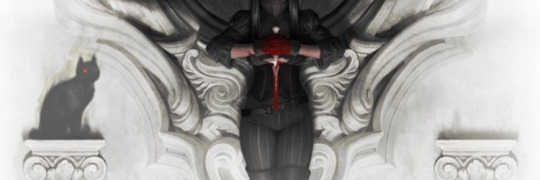
REVIEW // Nevernight (The Nevernight Chronicle, #1) by Jay Kristoff
★☆☆☆☆
So I’m very late to the party, but I just finished reading Nevernight by Jay Kristoff I had such high hopes for this series based off of what people recommending it had told me and what I read about it before picking up. Dark fantasy? Check. Strong leading lady? I’m here for it. Gays? It’s literally my only personality trait. Sign me up. Unfortunately, this book fell flat in all those categories. It reminded me a lot of Sarah J. Maas’s Throne of Glass, which made me take one point off of to begin with simply for making me think of Maas’s writing. Overall, I just found the book to be too predictable, with bad writing, exposition, and pacing, and too many parts that just made me ~uncomfortable~.
In case you are not familiar with this novel, Nevernight tells the story of Mia Corvere, a girl who lost her family when she was a child after her father was convicted of treason. When the book begins, she is 16 years old and embarking on a journey to join the Red Church, a school for assassins, so that she may one day be able to avenge her father’s death. Along the way she meets a bunch of forgettable characters whose names I can’t be bothered to remember and is taught by the most fearsome killers in the Republic. Here she gains many valuable skills, like how to survive being poisoned, how to fight, and how to get big boobs.
+ Side note: by chapter 3 three I started picturing Mia as the crow guy from RWBY and I could not shake that for the rest of the book
I had many issues with this novel that I will try to summarize in some sort of coherent fashion, but to be honest this book sucked the will to live out of me so I don’t know how much energy I can put into this review.
// image: official cover art by Jason Chan //
FOOTNOTES
The footnotes were probably the most jarring element of the book for me, and, unfortunately, there’s a lot of them. Their function seems to be twofold:
they are the form of most of the world-building, explaining several customs, the history of the institutions and peoples Mia meets, and the mythology followed by the people of the Republic.
they allow for the narrator of our story to interrupt with comical one-liners or cryptic foreshadowing
In my humble opinion, both of these are unnecessary and stupid. The interruptions come off as crass and immature and make the other more textbook, boring exposition come off as a joke, especially when it is dealing with sensitive or serious topics. There is one that explains this brothel called the Seven Flavors, which the footnote explains refer to “Boy, Girl, Man, Woman, Pig, Horse, and, if sufficient notice and coin was given, Corpse.” Now, on its own, this passing mention of pedophilia, bestiality, and necrophilia could very well contribute to the world building and tone of the novel, but when placed side by side with the childish, joking tone of the “cue the violiiiiiiiins” or, regarding the acoustics of a room, “…they were, as it happens, exceptional. Falalalalalalaaaaaaaa”, come off as way too light-hearted for the topic at hand. Maybe I’m being way too sensitive, but I’m pretty tired of authors using serious topics as off-hand remarks as a lazy way to make their world daker and grittier. Plus, these footnotes were just so incredibly cringy that I would recoil from second-hand embarrassment every time. They resemble the things I wrote when I was 14 and trying (and miserably failing) to be funny. Also… there are way too many of them. While at first I appreciated the attempt to deepen the lore of the story (I’m a sucker for world-building), after a while it became evident that the author was just forcing information down our throats without taking the time to actually weave the lore and background into the story itself. It came off as a very lazy way to force exposition.
OVERLY FLOWERY LANGUAGE
This story is BRIMMING with similes and metaphors, like every other sentence is some overly complicated way to describe something that could have been presented in three words. When you include so many metaphors/similes/etc., they begin to lose power. They should allow the reader to extrapolate more meaning and emotion from a sentence, but if the book is bursting at the seams with them, they become increasingly ordinary, to the point of losing all of their luster. One prime example appears on page 30:
“It was a bucktoothed little shithole, and no mistake. Not the most miserable building in all creation. [here there is a footnote about some other inn/brothel] But if the inn were a man and you stumbled into him in a bar, you’d be forgiven for assuming he had—after agreeing enthusiastically to his wife’s request to bring another woman into their marriage bed—discovered his bride making up a pallet for him in the guest room.”
So first of all what the fuck is that supposed to mean? That whole paragraph is a fever dream. Let’s begin with “bucktoothed little shithole”. Bucktoothed? Really? What does that mean. Please, someone explain to be right now what a bucktoothed building is. Is it uneven? Is it awkward? Is it half-finished? Is one side longer than the other? Did they do a bad paint job that only covers on side? Are the windows askew? Is the door too big for its frame? We already know from the paragraph above that it is “disheveled” as well, so why the need for another weird phrasing of its appearance? We then move on to that whole JOURNEY of a sentence, where the inn is compared to a man being cuckolded. That is the most insane tale-can you imagine running into someone in a bar and that story being the VERY FIRST thing that runs through your mind??? I know I’m focusing way too much on this stupid paragraph, but basically what I am trying to get at is that even though we spend half a page talking about how bucktoothed and disheveled and cuckolded this building is, we get no actual physical description of it. Imagine if Kristoff had just written that it was a run-down, ill-kept building that looked as worse for wear as its owner did. Done, one sentence. Great. Let’s move on. Instead, we spend so long reading these absolutely batshit descriptions that ultimately tell us next to nothing. Flowery language is placed over actual context. You may think that a description this long and complex means that this inn is a significant or recurring setting in the novel. Nope. It’s not. Mia leaves and that’s that. The reason that I’m focusing so much on this objectively irrelevant paragraph is because it is so representative of the biggest issue I have with the writing in this book. There are so many unnecessary comparisons that function only to make the author feel clever rather than add anything to the story at all. It’s very à la 2010s Tumblr.
THE (IN MY OPINION, BAD) WRITING
For the first half of the book, we are constantly being TOLD things rather than being SHOWN things. With the exception of one of the teachers cutting off Mia’s arm, we rarely see the ruthlessness that the assassins are so feared for, but we hear about it in nearly every other sentence Where are the consequences? I think this book would have been way more enjoyable if there were actually consequences to the characters’ actions. The inclusion of the weaver and the weird vampire guy completely remove any tension regarding the fate of the central cast. When Mia had her arm chopped off, I was shocked, and pleasantly surprised. How was she going to overcome this unexpected obstacle in her training? Then a couple pages later, its reattached with absolutely no lasting consequences. All of the initial tension and shock value of the loss of Mia’s arm is entirely removed because of the two incest-y siblings. Their entire purpose for existing is just to undo all damage to the main characters. Then suddenly, out of the blue, Mia is willing to take on a ton of consequences and completely throw away her chance at becoming initiated in order to avenge her family just to save Tric from receiving like one punishment??? Like why?? As an aside, the only moment I truly enjoyed was when Ash fucking stabbed Tric to death. I assume that when the reader’s favorite moment is one of the central characters’ death, it does not bode well for their reception of the book.
THE THEMES
TW: rape-y subjects
The author seemed a little too keen to include rape and sexual assault in his story. Mia withdrew her consent in the sex scene in the very first chapter, and even if you read it as consensual (which I do not), it is described as incredibly unpleasant on her end. Tric is the result of a rape, which is brought up several times throughout the story. Further, Mia is constantly facing harassment from men. I understand that this is frames the idea that the world she lives in is misogynistic and ruthless, but there are other ways to push that idea through other than constantly putting in her in those situations. As in, this didn’t need to be the ONLY way we explored this subject. Beyond the uncomfortable propensity for sexual assault, I also very much disliked the sexualization of the 16-year-old main character. Oh. My. Gosh. Mia is CONSTANTLY sexualized. Every single damn character makes comments about her body, how hot she is, how much sex she potentially has. It is so weird and uncomfortable. I feel the need to reiterate that she is SIXTEEN. There is, however, a focus placed on the power Mia can gain from seducing her targets. Girl power? Not to me, really. The issue I have with this is the idea that a woman has to be overtly sexual in order to be considered powerful. This is something that we can see in many female assassins and supposedly powerful female characters in fiction (like Black Widow) especially those written by men. Now, there is nothing wrong with using one’s sexuality as a weapon, and I’m certainly not saying that a strong female character cannot be sexual, but the idea that a sixteen-year-old girl is shown having her body painfully modified tp be more desirable, and in a graphic sex scene with another character, in order to for the reader to read her as liberated and powerful does not sit well with me. I don’t really feel like this aspect of her training should be relevant to the overall story. I wish the time that Kristoff had dedicated to hammering into our heads that Mia is a femme fatale to developing her Darkin powers instead. The way she is written now feels more like she is a faux strong female character written for a male audience.
Secondly, Mia is fully written as “the plain-girl-who-is-actually-pretty”. This whole trope bothers me IMMENSELY. YA is full of girls who are described as plain, forgettable, or ugly while their physical descriptions are just the dictionary definition of conventionally attractive. It seems like a way to market off of girls’ self-consciousness while still being able to market the main character as a hot heroine in official art. And there is, of course, the issue of Mia’s boob job Readwithcindy (just “withcindy” now!) did a whole video about this so I won’t get into it much just to repeat what she already said, but I agree that the idea of a 30-something year old man including this completely unnecessary detail regarding the sexualization of teenage girl, who we have ALREADY seen in a rape and being sexualized by other men in the story, made me really, really, uncomfortable. I highly recommend you go watch her video, as she touches on this in way more detail. [Cindy's video
RATINGS
Worldbuilding: ★★☆☆☆
A lot of thought obviously went into the world-the mythology, society, and politics are well-thought out. But the way they are introduced is annoying and bland. It seems like the author put a lot of effort into constructing this world but realized a lot of it would be left out of the book, so he crammed it into footnotes instead.
Tone and writing style: ★☆☆☆☆ for first half, ★★★☆☆ for second half
The tone of the first half is all over the place, like it doesn’t know if it should be dark and gritty or comical and immature. Footnotes and character dialogue ranges from lighthearted and crass to seeped with themes of torture and sexual assault. It is jarring, to say the least, and often feels like the author doesn’t take these ideas of rape or violence seriously. There are so many instances where the scene is tense or gritty, and Kristoff is actually writing it pretty well, I’m enthralled and on the edge of my seat, and then Mia or some other character (or the footnotes) throw in some stupid comment or make the same “Mia is such an asshole lol” joke for the billionth time and completely ruin the mood of that scene. The second half of the book moved much faster and was helped with way better writing, but it really did not do enough to make up for the horrendous structure of the first half of the book.
Pacing and structure: ★☆☆☆☆
The first half of the book really drags on. Once we arrive at the school, there are constant jumps in timeline, marked with periods when a thousand things happen all at once and the plot moves forward at a dizzying rate, and others when the characters just seem to be going about their daily lessons.
Concept: ★★★☆☆
I found the overall idea of the books to be very interesting, even though it is certainly not the most original or unique concept for a YA fantasy book. The issue is that the potential is squandered with a poor execution.
Characters: ★☆☆☆☆
I truly did not care about any of the characters. The token mean girl, the bumbling nice-guy-who-is-definitely-the-love-interest. too many of the characters just sat nicely within their tropes, doing nothing much to pique my interests. I think my favorite overall was Mister Kindly.
#nevernight#jay kristoff#mia corvere#goodreads#review#onestar#book review#book#books#ya#young adult#fantasy#dark fantasy#rant#rant review#godsgrave#reading#read#bookblr#star#bookish#bookworm#a duck with a book#ya fantasy#lgbtq#lgbt#f/f#jason chan#cover artist
18 notes
·
View notes
Text
Reckon with the impact of World War II on cinema history. In what ways did this cataclysmic event shape film as an art form? How do postwar films differ from prewar films either in form or content? Consider the examples that deal directly with the war and its aftermath, but reflect on earlier films we have seen as well, which may be useful points of comparison.
The aftershocks of World War II left the entire planet in shambles. From Japan to Germany and all the way to the United States, the effects were taking its toll on both their people and economies. More than sixty-one million people were dead. The shift in society was momentous, and affected the everyday lives of the average citizens, and government officials were left to pick up the pieces. One of the most noticeable shifts in artistic trends after the War was the change in the production of films. After 1948, some of the glitz and glamour left Hollywood’s movies, and directors and creators around the world began to take notice and incorporated darker, grittier themes into their work. Directors and screenwriters did not feel afraid to attack how their respective country had changed after the war, infusing their films with political tension and subtle criticisms of the powers that be.
The shift in darker subject matter challenged the Hollywood bauble. Even with the Code firmly in place, directors and screenwriters found creative ways to tell their stories around it. Subliminal messages conveyed through staging, dialogue and light became the norm after 1948. Instead of dealing with outside forces, such as unrequited love or corporate greed, narratives began to turn inward. Questioning the moral fiber of man and what good or evil we do with the immense amount of knowledge at our fingertips became the groundwork for post-war cinema.
In Hollywood movies, directors had to be subtle and creative about showcasing their criticisms of American ideals on screen. Through the use of cinematography and subtext, a film like All That Heaven Allows can seem like a romantic drama on the surface to the average viewer. However, Douglas Sirk was able to infuse the film with multiple layers of subtext which criticized the highly sought after and idealized ‘American Dream’. Sirk wanted to take a good, hard look at the kind of lifestyle so many American soldiers had fought and died for.
Cary is a wealthy widow who falls in love with a younger man who is of lower class than she is, a gardener named Ron. Through Cary’s story, Sirk is able to turn the narrative inward to inspect the pillars of American suburban life: order, conformism, and intolerance. Cary’s friends and neighbors are aghast that she is planning to marry again, and to her gardener at that. Sirk attacks the snobby and patronizing attitudes of Cary’s upper-class acquaintances, who appear to be friendly to Cary on the surface. Even her own children appear to be devastated by her personal choices about her love life. In a scene where she is talking to her son, he speaks to her from the other side of a screen, his face obscured by wire mesh. Almost like he is talking to her from the other side of a cage. A metaphor for the manner in which Cary’s children and friends have her trapped inside of their expectations for her as a widow, as indifferent to her wishes and desires as grouchy prison guards would be towards a recalcitrant inmate.
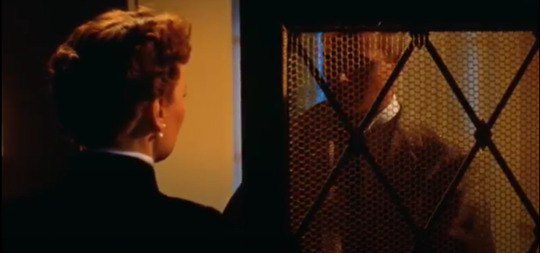
Materialism of the American suburbia becomes another subject for Sirk to condemn near the end of the film. Cary’s children, pleased with their mother’s apparent decision to stay away from Ron, present her with a television set for Christmas. In the shot below, Sirk uses the television screen to again show us how Cary is trapped, this time by consumerism. Her son earnestly believes that she will have all the company she needs now that she owns a TV, seemingly forgetting the fact that he snubbed Ron when Cary first introduced him to her children. Her son believes that her gardener that is below her class is absurd for companionship, and yet a television set seems adequate for the lonely widow. In 1955, the age of gluttonous consumerism, replacing a loved one with a material object would have been seen as normal.
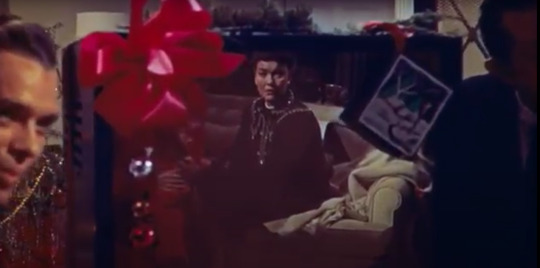
This is different from a film such as Ninotchka, where not even the USSR could keep Ninotchka and Leon apart, compare this to when Cary almost ends up letting Ron go. Between her children’s unhappiness and the way her friends have refused to accept Ron into their social circles, the future for them looks utterly hopeless for a time. Unlike in Ninotchka, where her comrades are more than approving of Leon. When Cary and Ron do eventually get together at the end of the film, Sirk dramatizes this moment by having Cary lit up in an angelic halo and even goes over the top by including a deer arriving at the nearby window. Ron’s recovery from his injuries is also miraculous, further adding to Sirk’s subtle critique of the American melodrama.
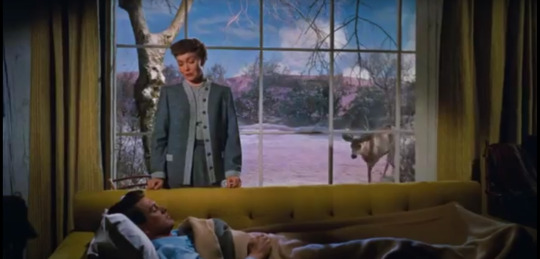
Other countries who suffered much greater losses from World War Two, such as Japan, instead chose to make something entirely new out of the suffering they had endured. Suffering not just one, but two atomic bombs dropped on their country, Japanese cinema underwent one of the most drastic transformations after the War.
One director looked at the devastation of Hiroshima and Nagasaki, and somehow found inspiration to create something from the horror. With a negative attitude towards nuclear weapons and all they stood for, Ishiro Honda directed Godzilla as a metaphor for the destructive and devastating powers of atomic bombs. Nuclear testing conducted in the Pacific Ocean’s Marshall Islands by the United States in 1954 sparked both an anti-nuclear movement across the country and inspired Honda to create the film. Twenty-three sailors aboard the Dragon no. 5 were within range of the fallout of the blast perished within days of returning home, since the weather had shifted past the US military’s calculations. The blast was also much more powerful than the US had predicted, raining death ash on the fisherman, who were positioned over eighty miles away. The story of Dragon no. 5 swept across Japan, gripping its people in panic of a possible third nuclear disaster, compounded by the fact that it had only been nine years since Hiroshima and Nagasaki were destroyed.
In the film’s story, Godzilla is created by an ordinary lizard feeding off of the nuclear radiation that is present in Japan’s waters and mutating into its current monstrous form. Not only is he capable of crushing massive buildings with just his body, but the monster is also able to breathe fire that is hot enough to melt steel.
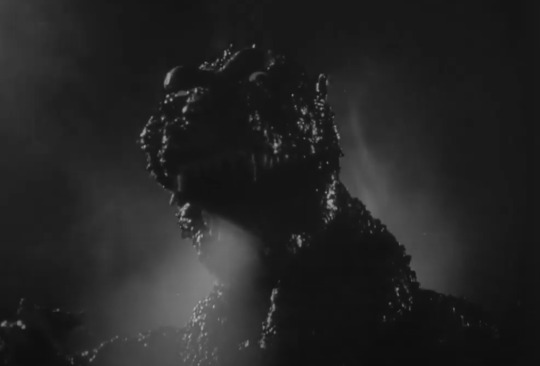
Honda had visited the ruins of Nagasaki, after returning to Japan from being kept as a prisoner of war in China. What he saw shook him to the core. Honda insisted that the texture of his scaly skin replicates the lesions that would form on those in Japan who had suffered radiation poisoning and cancer after the atomic bombs had been dropped.
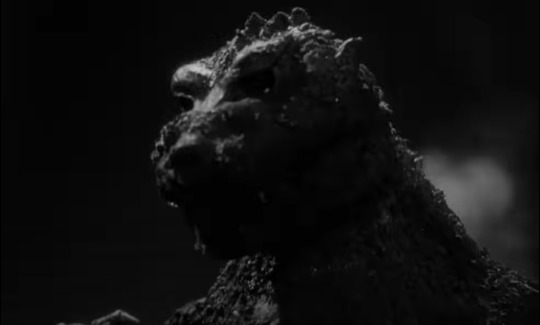
Throughout the film, Honda uses Godzilla to mirror the strength of nuclear weapons by showing the Japanese military’s inability to harm Godzilla with any of their weaponry. The film contains deep political subtext, hinting at the ongoing nuclear arms race between Russia and The US, seen near the end when Doctor Serizawa is conflicted about using the oxygen destroyer to kill Godzilla. He states that he worries about the world’s politicians becoming interested in the oxygen destroyer even after one use, and that ‘right now, it’s nothing but a weapon of mass destruction’. It is not difficult to guess what he meant by ‘world’s politicians’, with the tensions that were present in the early years of the Cold War. Although witnessing the destruction Godzilla has wreaked on land is enough to change his mind, Serizawa still destroys all of his notes and research about the oxygen destroyer. He goes even further and volunteers to use the device on Godzilla himself, and he ends up dying in the process. In his mind, taking the secrets of what might have ultimately ended up eradicating humanity with him to his grave was the only way to keep the world safe from destruction, a key insight into just how fiercely the Japanese people felt animosity towards nuclear warfare.
Other directors in Japan chose to look inward and see how the War might shape one’s morals and attitudes. Akira Kurosawa tackles this in Rashomon, a film that both defined a new method of telling a story and questions the concepts of truth and human knowledge. To this day, Kurosawa’s groundbreaking technique is still utilized in modern movies. Normally, flashbacks in film were meant to be taken as entirely truthful. Kurosawa disrupts this trend in Rashomon. In Rashomon, a nobleman is supposedly murdered by a crazed bandit named Tajomaru, who also rapes his wife. Three men are discussing the event while taking shelter from the heavy rainstorm in a ruined temple, two of them having been at the court hearing. Four characters recount the story throughout the film: Tajomaru, the nobleman’s wife, the nobleman himself, communicating through a medium, and finally the woodcutter who is at the ruined temple. The medium’s confession is thought to be the truth, since the monk says that the dead cannot lie. The husband’s version of the story is the darkest, the effect multiplied by Noriko Honma’s feral and terrifying performance as a medium for the dead.
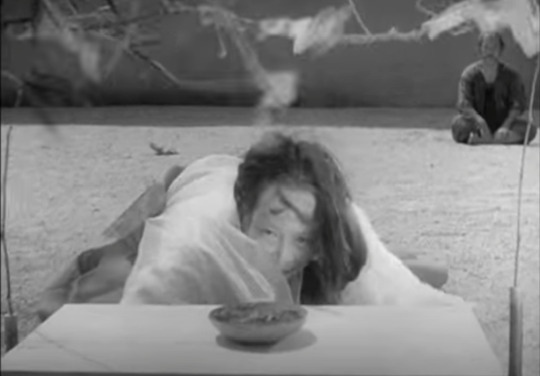
Each telling of the story shows the audience that there are obvious inaccuracies from one person to the next. In one recount, the husband orders his wife to commit suicide after suffering the shame of being raped. In another, the wife begs the bandit to kill her husband and take her away with him. This leaves the audience with many questions. Obviously, someone is lying. Only at the end of the film is the truth revealed whether or not we believe it by then. The woodcutter admits that he lied during his hearing at the court, that he had not just found the husband’s body and the wife’s discarded hat. Allegedly, he witnessed the entire unfortunate encounter between the married couple and Tajomaru unfold before his eyes. At first, it is hard to take the woodcutter’s account as truthful, since the entire film up until this point has been about how people will lie and deceive others, as well as themselves. Kurosawa’s story is dual-sided, since he displays the foulest traits of human nature, and people’s desire to better themselves.
The woodcutter proves himself to be noble, when the three men are interrupted by the sounds of a crying baby, abandoned at the temple. The common man grabs the kimono the baby was wrapped in, as well as the protective amulet that was left with the infant and runs off. The monk picks up the child, unsure as to what to do. The woodcutter reaches for the baby, and the monk reacts negatively, accusing the man of wanting to take what little the child has left. The woodcutter is hurt by this, and says he was going to take the baby home, since he already had six children and one more would not make a difference. The monk apologizes and lets him take the baby, stating that the woodcutter’s actions had restored his faith in the human soul. The baby itself is a symbol for hope for the future of the people of Japan, further punctuated by how the rain has finally stopped, and sunlight shines down on the woodcutter as he carries the infant home.
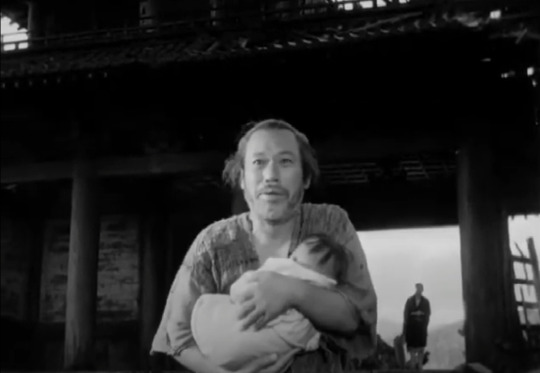
War does not often come to mind when we consider sources for artistic inspiration. It is an ugly, horrible thing, and World War Two was no exception. However, just like with the Motion Picture Production Code, filmmakers were still able to create masterpieces even after a crippling hardship. Whether it be through direct or indirect means, directors and screenwriters are always influenced by the world around them and it shows in their work. Watching films from the past is almost like viewing a time capsule, the current trends and conflicts of the world reflecting on screen.
24 notes
·
View notes
Text
Neon Genesis Evangelion analysis chapter 19: Tabris, The final angel Trigger warning: Bodily harm
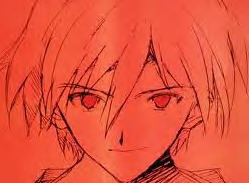
Nagisa Kaworu is concurrently the 17th angel and the Fifth children and even his name is full of word plays. 渚(Nagisa) is シ者 (= Shito = Angel) placed together and カヲル(Kaworu) are each words that comes after オワリ(Owari, meaning The end/ Final). His name is already full of clues to his identity as the final angel.
While he is classified under the category of angels, he is also a ‘human’ with Adam’s soul, just like how Rei is a ‘human’ with Lilith’s soul, and yet Kaworu himself refers to humans as Lilin, cluing us into his mindset that he is not a human, this mindset is his greatest distinction from Rei. Adam’s soul was likely captured during the contact experiment that lead to the Second impact or soon after, but the identity of the body is unclear. Rei’s body was constructed with Yui’s DNA as the base, thus Kaworu’s body too should have come from another person. Some argue that it could be Misato’s father, but it will not be delved into as the lack of information will only lead us to speculate.
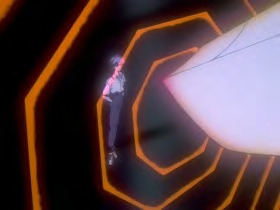
Shinji: AT field?!
Kaworu: Yes, that’s what you call it. A sacred territory that no one else can invade. The light of the soul
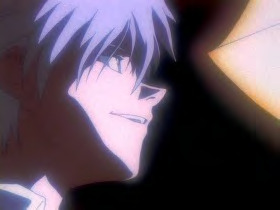
Lilins should understand as well. Everyone with a heart can put up this barrier.
While Kaworu is living as the container for the Soul of Adam and act in accordance to it, he is an Angel called Tabris. Some say that his name appears on the Dead Seas Scroll but there are no supporting evidence. Rather, considering that he is an artificially created angel, and the difference he shows from the angels we have seen, it is likely to be a lie purported by Seele. In the canon materials, Tabris is referred to as the angel of “Freewill” and concurrently the angel of “Betrayal”.
This is why Tabris was able to break his promises with Seele and designated the future of humankind to Shinji. He has the body of a human but is able to materialise his AT field like the angels. But that does not mean that he has the S2 engine like the angels, rather from his conversation with Shinji, we can understand the AT field is light of the soul that everyone has and Kaworu is able to materialise it as he is aware of his nature of existence. Humans that live as atomized individuals that survive through cooperation need to use the AT field only to the extend of stabilising their bodies, Adam’s descendants that are singular unified being utilise AT field out of necessity for survival.
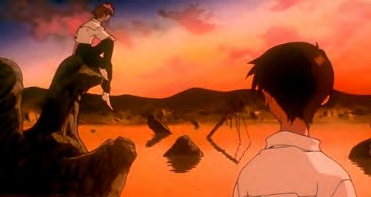
Music is great! It shapes your heart in a beautiful way. It is the pinnacle of Lilin’s culture
Because Kaworu was born with the mission to destroy humanity, his interest in them was inevitable, showing great interest in their culture and psychology, just like the angels that came before him, and who are also his descendants. When he first meets Shinji, he is humming to Beethoven.
He especially praises music and this is key is understanding the adoration he and the other Adam based creatures have towards Lilins. Unlike Adam based lifeforms, humans are capable of death, and are equipped with knowledge to deal with the adversities, and it is through this knowledge that civilisation and culture is based on.
It is in similar vein as Lilin’s adoration of the angels’ capacity for life. Perhaps Kaworu was also in adoration (and Loved) Shinji. The melody that is hummed and played over and over again in this episode is Beethoven’s Symphony No. 9 and this has to be seen as an apt choice by Anno. The forth movement of this symphony, one base on “Ode to Joy” is a poem telling the message that all humans are equal in the eyes of God. Furthermore, the lyric that plays when Kaworu is descending down to Central dogma is “und der cherub steht vor Gott!” translated to “The angel stands before God”. No more needs to be said.

Comparison of Rei, Shinji, and Kaworu’s synchronisation rate
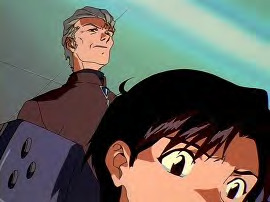
Fuyutsuki: I take it that this data is accurate?
Maya: According to magi, there is no chance of errors in the data. It’s unbelievable that he can achieve this numbers without needing a replacement core
Misato: But it is happening right in front of us.
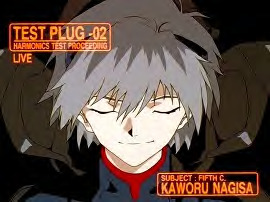
Misato: we have to accept the fact before probing to understand the cause of it
When Asuka has been mentally decapitated, there was no one that was left able to control Unit – 02 with the soul it contained, and it was only Kaworu with the soul of Adam that was able to do so. This sets him apart from Rei who was able to move Unit – 01 just to the functioning level. This comes from the difference of Kaworu’s awareness of his and Unit – 02’s identity as Adam, while for Rei, she was only following orders and only with slight awareness of her ‘special’ nature.
This awareness that Kaworu had of himself gave him grounds to see himself as complete and therefore able to open himself up to the emotions of others. We can imagine him becoming friends with Shinji in this vain, but his intentions at this point is unclear. All we can say for sure is that through his interaction with Shinji, he came to learn the “Value of living” that he was unaware of.
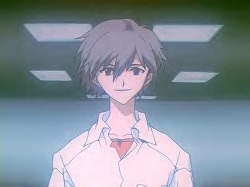
Hey, did you wait for me?
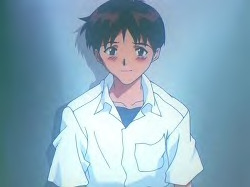
Not… exactly but…
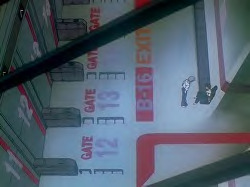
Kaworu: What are you doing today?
Shinji: Erm, since all the tests are done, I just need to shower and then go home
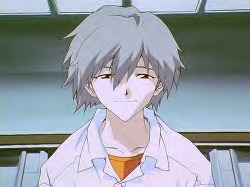
I think it’s great to have a home to go back to. – Perhaps this sums up the feeling of the angels who have lost their homes.
In their first meeting, Kaworu sees in Shinji experiencing a strong feeling of the fundamental pain and loneliness of humans. And by his side, Kaworu sees Shinji overcomes this feelings, and come to be able to smile once again through interaction with others. It makes us wonder what was going through Kaworu’s mind as he lay beside Shinji talking openly about his feelings beside him all night long.
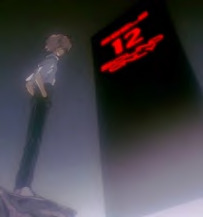
There is a man striving to attain the power of the gods
There is a man other then us trying to open the pandora’s box
That man is trying to shut the box before Hope has the chance to leave the box
Before we move onto other discussions, lets talk about the relationship between Kaworu and Seele. In Seele’s point of view, Kaworu’s purpose was to initiate the Third impact. This mindset had the premise of atonement of Lilith and that the burden of “carrying” it out was to be on Seele that saw themselves as the “Representatives of all Lilins”.
Understanding their relationship is central to understanding Kaworu as a character yet in the series, we see him communicating with Seele once, at the lake that was created when Unit – 00 self-destructed.
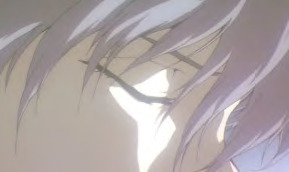
Hope? You mean that of Lilins?
Adding on to the conundrum is that this sequence was only added in the Complete version. But, as covered in Chapter 10, we can see that Anno believed this sequence to be important in the understanding of the series as it was added in this version. And to prove this point, in this conversation we are told of the White and Black moon, of Adam and Lilith, and other secrets that are important in the understanding of this series. But there is something that stands out in this scene. As mentioned before, here we see fifteen monoliths (thus members of Seele) instead of the normal twelve. Furthermore, when we see from Misato’s (Who was spying on Kaworu) perspective, we do not see the monoliths, we even here Misato saying that he is talking to himself.
While Misato not being able to observe the Monolith is explainable with Kaworu’s ethereal existence, it is difficult to justify why there might be fifteen monoliths here when it has been a constant twelve until this point. Some in the community simply brush it off as a mistake in the production phase, there is a chance that is represents souls of the Angels that have came before Kaworu did (If we consider Israphel as having two souls, that makes total fifteen). This theory is further supported by the manga version where Sandalphon and Matarael does not make an appearance, of Evangelion having thirteen monoliths in this scene.
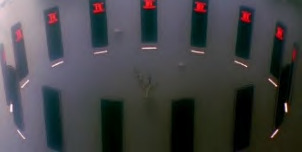
We entrust you with our hope
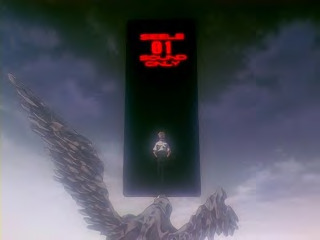
During this scene, we see Kaworu standing on a bizarrely shaped stone that has changed in its design during this sequence. It is named “The angel stone” in the development document and it contains many foreshadowing and references. During his first encounter with Shinji, Kaworu is sitting at the area pertaining as its “Head”, and this clues us into his relationship with this sculpture. Later during his conversation with Seele, he is at the same spot standing and the sculpture has now lost its head. This foreshadows his soon to be met fate of losing his head by Unit – 01.
After the scene of his decapitation, we are shown the sculpture one last time, with red blood flowing out of it.
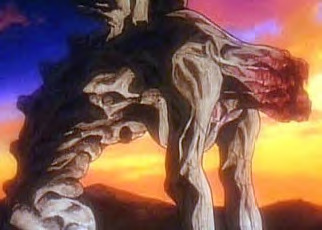
Foreshadows the end of Kaworu
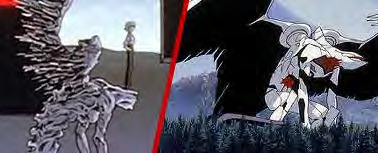
This sculpture serves as a reference to other things that are shown later in the ‘End of Evangelion’. Namely the being that is Lilith (+ Adam). Its wings also resemble that of the mass production models, especially since it was Kaworu’s Dummy plug that was used to pilot these models.
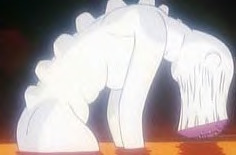
Yet the breast of the sculpture is feminine, along with its arched back resembling that of Lilith as she drops her mask it can be considered a reference of her as well. And since she was also decapitated in the end its not a farfetched argument. If we were to postulate, this may also clue us to the possibility of a loop in the story structure.
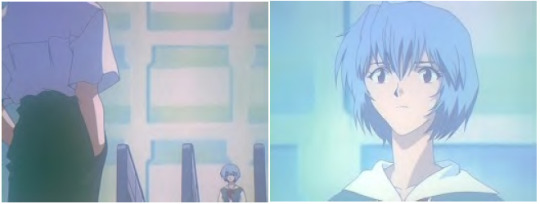
Are you the first children Ayanami Rei?
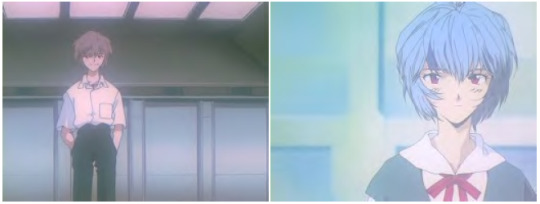
You are just like me
Kaworu: Does all of Lilins on this planet have the similar form?
Rei: Who are you?
Kaworu’s first meeting with Rei is also important. He makes a gentle smile as he tells Rei that they are similar beings, and the note that Anno made on this scene personally was the “Smile of betrayal”. So who is he betraying? His smile is directed at Rei, but the betrayal was towards Seele. In other words, Kaworu proving Rei with the clue to her Identity (as Lilith) was him breaking the agreement that he had with Seele.
When seen from Seele’s point of view, Lilith is the object of atonement, restraining her was of absolute necessity. That is the reason why they have kept Lilith’s soul separate from her body. If Rei was to come to a realisation of her identity, it would serve as a variable in their plans, putting it in jeopardy. This betrayal reaches its climax when Kaworu makes his decent into central dogma.
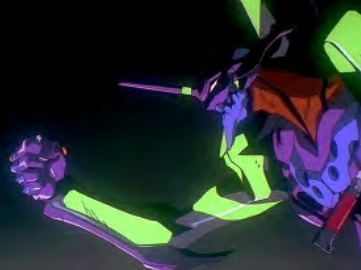
Kaworu: Now kill me. If not, all of you will perish.
And you are not a being that deserves to die like this.
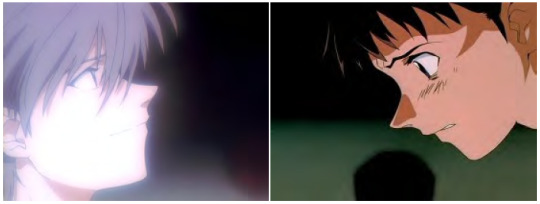
Kaworu looking at Shinji
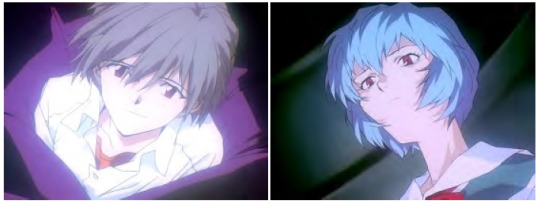
Kaworu looking at Rei
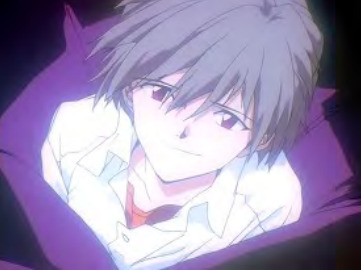
And the smile
Kaworu’s decent into central dogma was followed by two people. First was Shinji piloting Unit – 01, the other was the Third Rei. Kaworu came to realise that Rei did not understand the situation she was in, albeit she was sharing her soul. If we look at his expression when his eyes met Rei’s in central dogma, it is as though he is telling her “Look, that is your real body”. As for his surprised reaction when he saw Lilith, if we were to think at how he said it, carefully stating out that it is not Adam but Lilith, he is explaining for someone. An exposition for the audience, but also, to tell Rei that this is Lilith.
Whatever the truth behind that smile may be, we can be sure of the fact that Tabris intentionally approached both Shinji and Rei to confess his feeling for both of them. Rei followed after Kaworu after emitting powerful wave of AT field and Kaworu knew that she was watching. After his final goodbye to Shinji, he looks at Rei and smiles the “Smile of betrayal” for the second and the last time. It is right after this scene, that is depicted in the starting sequence of End of Evangelion that Rei breaks Gendou’s glasses and returns to Lilith alone.
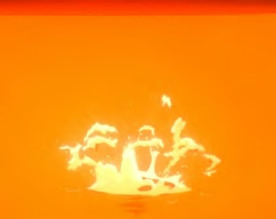
End of Kaworu
It appears that Kaworu was prepared for his fate before entering central dogma. He uses Unit – 02 to hinder Unit – 01, but unlike Shinji who aimed at Unit – 02’s neck, Kaworu aimed only for the non-vital areas and bought time. He confirmed the presence of Lilith’s body in central dogma himself and conveys his feelings towards Lilith (Third Rei), and without regrets entrusts his fate to the Lilins who he loves greatly. He entrusted the decision to Shinji.
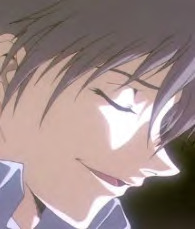
I know. That why I am here
Seele considered Lilith and Lilins to be sinners and sought for the atonement of the original sin, yet Kaworu who was entrusted with that role only comes to curiosity and an even greater love towards Lilins.
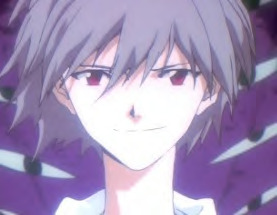
When he sees Lilith’s empty husk in the central dogma awaiting the return of her soul, he realises the difference of meaning each Lilins attach to “Hope”.
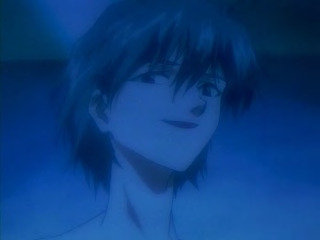
That means that I love you
It may have been just for a day, but through his interaction with Shinji, he comes to understand the pain, suffering and anxiety a pure fourteen-year-old boy faces and live with.
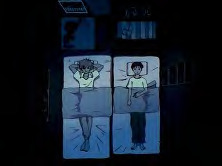
Kaworu: Do you hate people?
Shinji Not really, I just don’t care what happens to them anymore. But I hate my father.
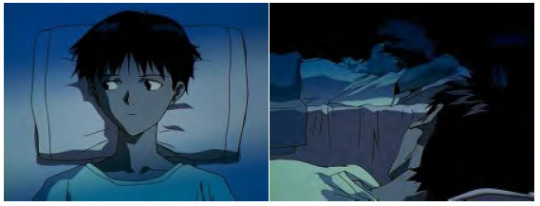
Why am I telling him all this?
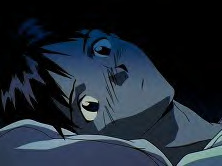
Throughout this process, Kaworu as Adam have come to forgive Lilith and Lilins. The old man of Seele called this betrayal. And Shinji who has come to love him mistook his actions as betrayal as well. But it is at this moment that the original sin of Lilith and Lilin was forgiven. This lead to my claim to the central thesis of Neon Genesis Evangelion. It is that “True love comes from the effort to understand the other, thus achieving completion (Instrumentalization)”
Perhaps Tabris, the final angel knew this and acted accordingly.
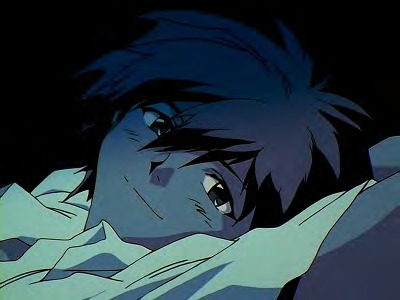
I might have been born to be able to meet you.
#Neon genesis evangelion#Evangelion#Eva#End of evangelion#Nge#Nagisa Kaworu#Lilith#Sci-fi#Ikari Shinji#Soryu Asuka Langley#asuka#Ayanami Rei#rei#Anno Hideaki#Katsuragi Misato#Anime#Analysis#Review
111 notes
·
View notes
Text
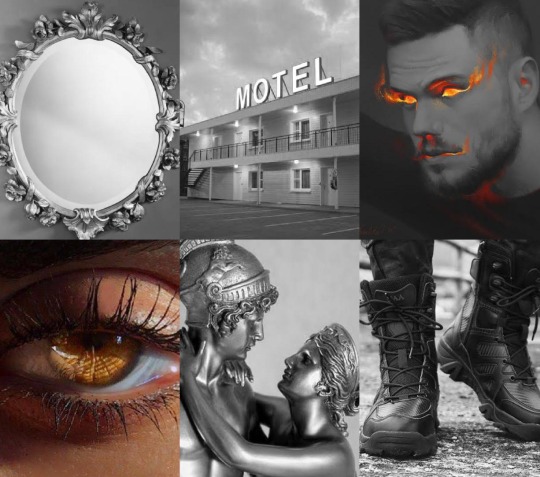
love and war
a demigod au [companion] ficlet
~•~
Theo's eyes snap open when he hears the loud honk from outside the motel they're staying. He sits upright in his makeshift bed on the cold floor. It's still dark, and when he checks the clock in the room, only an hour has passed since they went to bed.
He transfers his gaze at the sleeping lump on the single bed, wrapped tightly in the comforter like a human burrito. Stiles is dead to the world, open-mouth with a bit of drool on one side. He looks so young and innocent and can't hurt a fly like this. But under his pillow, Theo can see the handhold of his dagger. They're almost to the entrance of the Underworld now. More monsters are after them. Caution and vigilance are of utmost importance if they want to come back from this quest alive.
Soft snoring takes his attention from Stiles to the shape on the couch. Involuntarily, Theo scowls at the sight of him. Derek Hale, son of Poseidon. He still can't believe he's on a quest with him, or even that all three of them are together in some mad twist of fate and managed not to kill one another yet. Barely, but still. Their godly parents are the worst rivals and are the three Olympians on the verge of a war if Theo, Stiles, and Derek fail. The last thing they should become is allies.
Derek shifts and Theo notes that he looks uncomfortable in his position. It makes him oddly satisfied.
He hears the loud honk again, but it's apparent now that only he does among them. Otherwise, his two companions would have sprung up, wide-eyed and ready to pounce, no matter how exhausted they had been from a full day of running and fighting monsters.
Theo gets up to his feet, clutching the hilt of his sword, and approaches the window guardedly. With sure fingers, he pulls down the blinds enough to peek. The image that greets him gives him a moment's pause, lips parting in surprise.
Outside, a spotless, white limousine casually parks on the deserted road. A muscular man in black jeans, combat boots, and a red muscle shirt underneath a black vest leans against it. There's a familiar sneer in his mouth noticeable even from afar, and though he's donning sunglasses, Theo knows his eyes are on him.
He's imagined this happening since his claim at Camp Half-Blood. If he appears to him right now while Theo's in the middle of a make-or-break mission, things must be getting worse in Olympus. He usually communicates to Theo in vague dreams, in a voice in his head, in some other weird manifestation since this started, but never coming to him in the flesh.
He lets go of the blind, delays for a second of contemplative silence, and then opens the door to meet his father, the God of War, Ares.
~•~
He slows his steps as he nears the broad figure. Up close, Theo notices the fire reflecting from inside his glasses. He has heard from his siblings that their dad had fireballs in his sockets instead of eyeballs. And that any children of Ares are compelled by unexplainable force to meet those flares, cowering.
Theo stops and raises his chin to meet his father's gaze, and no matter how he tries and how tough he is, he still dips his head in submission to the god. He swallows, "Father,"
His reply was a terse and detached, "Son,"
Theo lifts his head again, not quite meeting Ares's eyes this time, and hesitates for a second, but asks, "What are you doing here, father?"
The god's face twists like he has swallowed a lemon. His head fastens in the direction of the room Theo is renting for the night. "You have such unpromising companions," he spats, glaring at the window as if he sees through it. Ares probably does. "The son of Poseidon I can scarcely forgive," his attention slips back to Theo, and even without the proper organs, Theo can feel the disgust that would be reflected in them if he had eyeballs. The disapproval is rolling like waves in his aura, and it makes dread crawl up Theo's spine. He hates that his father can evoke such emotions just with his presence. He's also starting to feel his blood boil. "but Athena's spawn?"
Theo bites his lip and balls his fists to avoid saying something that will make his father smite him to smithereens. That is not at all the way he had imagined his first meeting with his father to end.
"She dares call me a thief," Ares's voice does not rise, but it doesn't have to. Theo's hyper-aware of his father's rage, and it makes his knees quiver to kneel and supplicate.
Theo forces to say the words, "Stiles is helping to find an end to this conflict,"
Ares scoffs, unimpressed. "And by an end," he crosses his burly arms. "You mean victory against our enemies in the war."
Theo shakes his head, breathing through his nose. "I was thinking about not starting a war at all."
The look Ares gives him makes his stomach coil, and he hates it. The god regards him similarly to an insect: small, insignificant, and revolting. "No child of War runs from war."
Theo breathes in deep, his blunt and dirty nails digging in the skin of his palms. "There isn't one yet, that is necessary."
Ares's face thunders and the fire in his eyes glow brighter. It seems the god expresses no aversion to smiting his son right then and there. "She slandered my name-"
"Ares, dear, do be nice now." A silky, feminine voice interrupts his father from inside the limo. And amazingly, the god's anger deflates, albeit grudgingly. He's still enraged, but he's holding himself back from committing a crime. Theo inwardly sighs in relief.
The god purses his lips, nose flaring slightly, "My Lady wishes to give you a weapon,"
Theo draws his eyebrows together, "Your Lady?" Just as he says the question, the answer comes to Theo. He remembers the afternoon Stiles discussed with him in their session about his father's amorous relationship with a fellow Olympian.
"Aphrodite is the goddess of love and beauty and is married to Hera's son, Hephaestus, the god of the forge. The union forced upon Aphrodite as it was a condition made by Hephaestus so he would free his mother, Hera, from being bound into a magical throne he built and tricked the queen of the gods into sitting. Zeus granted it, and so they were married. Aphrodite resented his husband because Lord Hephaestus was, in the standard of the divinities, ugly and lame, and therefore, not befitting the goddess of beauty.
The god tried to gain her affection by designing beautiful jewelry for her in his workshop. But she wasn't interested. Instead, she used the opportunity of his husband's work arrest in his workshop to be unfaithful and be with other gods or goddesses, and even mortals.
Then she met Ares, and they fell in love. They kept on having affairs with other immortals and mortals, but they always came back to each other -even though that's against the rule of formal infidelity of the Greeks."
"Bring him in, dear,"
The soft voice breaks Theo's reverie, and with a huff, his father motions him to the door as requested by the goddess Aphrodite.
He doesn't know what to expect the goddess of beauty would look like, but when the door opens, Theo catches a glimpse of the car's occupant, and he thinks he hallucinated Stiles for a brief moment. When he blinks, he now sees the flowing hair and feminine features instead of gelled up hair and slender muscles.
He takes a seat, and the door shuts. Theo finds himself captivated by the different aura that she emanates in comparison to what he had felt with his father. His skin feels warm instead of burning, and his heart steadies instead of races. He stares at the face of the goddess, and if he isn't so gone, he would have remembered his manners -whatever little he has. At least, the goddess doesn't seem offended by the rapt attention -she's probably used to it- but amused.
Theo had never mentally built a picture of the goddess, but he didn't expect for her to have moles sprinkled in her pale face or have amber, almost molten liquid, eyes. But she has an elegant upturned nose and pink cupid's bow lips, which are as expected. Her features remind Theo so closely of Stiles. That must be why he thought he saw him for a second there.
When she smiles, it even feels familiar to Theo.
"What do you see?" She asks.
"Um," Theo swallows and licks his dried lips. "Your beauty, goddess."
She emits a soft, coy chuckle. "It is not universal. Do I resemble someone specific that you know?"
The question throws him for a little, and he blinks. "Yes," He says honestly, figuring there is no point in lying.
The smile on her face broadens, "My beauty is an individual's perception of it, son of Ares. It is one or the other, depending on who's looking."
He frowns, confused. Before he can ask what the goddess is trying to say or process it himself, Aphrodite procures an object in her hands that she passes to Theo. When he looks down at the item, it's a palm-sized rose looking-glass. He sees his reflection as he studies it. It's a simple circular mirror with roses encrusted around it; each petal is elaborately carved.
"It is a present from my husband," the goddess says.
Theo nods, thinking it makes perfect sense. Something as well-crafted as the item he holds must only be from a god.
"When you absolutely need it," she continues, "look upon the mirror, and help will come. It grants only one call."
He gives the goddess a quizzical look, "Why are you giving it to me, though, Lady Aphrodite? I am grateful and honored to receive such a gift," he hastily adds, remembering Stiles's warning of always showing gratitude to the gods. It avoids spontaneously combusting. "But I don't know why me?"
Thankfully, she seems to be in good spirits because she only inclines her head. "Do you think it appropriate if I gifted that to the children of my beloved's rivals?"
Theo made a humming noise.
"I must say," she adds, "I assumed if it was the son of Poseidon I invited, I know what image he would see in my face. But, I wonder," she gives Theo a look, her brown eyes twinkling in the same fashion as Stiles's when he formulates a clever, and devious idea. "If it was the son of Athena, whose face would he have seen between two?"
Theo pauses, caught off guard.
Then, the goddess straightens. "Remember. Only once. Choose the moment wisely."
Theo opens his mouth to thank her once more and asks what is in exchange for the goddess' generosity. Stiles had also taught him that gods don't just hand out presents to the mortals they favor without a deed or a sacrifice. But, the next time he breathes, he's back inside the room, sitting in his comforter on the floor.
He blinks rapidly and scrambles to his feet toward the window. He pulls the blinds aside and sees nothing but a deserted road outside where the limo has been.
He almost thinks he dreamt it, but when he looks at his hand, Aphrodite's mirror is in there.
"Remember. Only once. Choose the moment wisely."
~•~
[1][2][3][4][comp 1]
#teen wolf#steo#steo ficlet#steo au#teen wolf au#teen wolf crossover#camp half blood#teen wolf characters#as demigods#demigod au#tw demigod au ficlet#teen wolf demigod au series#word count: 1935#fics tag#i just remembered this scene#in pjo 3#the titan's curse#and i had to make a steo version lol#demigodseries
49 notes
·
View notes
Text
Meltdown
I DIDN’T EXPECT TO HAVE THIS DONE TONIGHT BUT HERE! But fair warning, I don’t know if this counts as body horror but there’s still some kind of disturbing imagery involving shapeshifting going wrong and comparisons to a person melting. I worried about this being excessive but I warned you!
I just felt like making angst for Nagi to be perfectly honest and showing more of the drawbacks of her big power.
Here you go!
Nagi had lived long enough with her ability to shapeshift to be able to recognize the signs of an oncoming meltdown. When her power was stretched to its absolute limit and its response was to essentially kick itself into overdrive until her body couldn’t take the strain. Her usually cool skin would gain an unpleasant heat that itched before it evolved to what felt like flames on her flesh, her vision would begin to blur as her eyes struggled to keep a solid form, and movements became sluggish, uncoordinated, and incomprehensible.
If she were to compare her shifting to her body becoming clay, then a meltdown was like she was melting. It was not a pretty sight.
Just her luck that Nagi could feel the heat spreading throughout her being when surrounded by those she wouldn’t hesitate to call her family.
It was the aftermath of another fight with the Demon Bull King’s forces and she supposed that her superfluous transformations to escape the enemy’s notice while sabotaging them underneath their notice were to blame. She had felt fine as they all celebrated, everything was fine. Until she made one last shift for the day, taking the form of MK to poke fun at the young man’s attempts to look cool during the fight.
That was the straw which broke the camel’s back.
She froze in her tracks as an unhealthy flush came to her borrowed face, shivers running her frame despite the fever and if she was capable of sweating, Nagi was sure she’d be sweating buckets.
“Please, not now,” she whimpered to herself, struggling to keep sight of the others as her sight began to give way. Her hair began to droop from MK’s gravity defying spikes and legs started to feel limp, as if her very bones were beginning to soften into liquid. The sounds of her panicked wheezes quickly got the others attention, her chest being stabbed with guilt at the sight of their looks of concern.
“Nagi, are you okay?” Sandy asked, reaching towards the demon to see if she had gotten injured during the battle. Only for his hand to sink into Nagi’s shoulder. And when he pulled away in shock, some of it stuck to his hand to form a goopy bridge between the two which drooped lazily before falling to the ground. Nagi sluggishly watched, drops of what she was pretty sure wasn’t sweat beginning to trail down her face. It only faintly registered to her ears that MK and Mei were now screaming in horror while Pigsy and Tang seemed to be struggling to contain their nausea.
“Sorry Sandy… I overdid it. Now I’m… melting,” She hissed, struggling to translate her racing thoughts when her lips felt like molasses much like the rest of her. Nagi didn’t even notice as her hair continued to droop downwards, not so much as growing in length but dripping down like candle wax. “But it’s okay… this happens. Not dying. Things will just get… messy.” Her hair was now a menagerie of different colors that seemed to be constantly shifting in no set pattern.
“Messy how? Is there anything we can do to help you?” Tang asked, feeling helpless as he watched Nagi’s clothes melt into a bizarre fusion of his robes, Mei’s biking suit, and Princess Iron Fan’s dress. The sleeves of her clothes obscured her hands but with the way they seemed to move, Tang knew it wouldn’t be a leap to assume that the sleeves had become her hands. She gave a slow shake of her head, giving a wince as familiar bull horns sprouted from the sides of her head in response. A strangled groan of pain left her lips as a metal plate covered her chin and circled her eyes.
“Can’t stop shifting. Keep changing. Hurts. Melting. Pass out. Can’t do anything. I hate it, I hate it, I hate it!” Nagi screeched, flipping from lethargic to hysterical fast enough to cause whiplash.
It was then that her body went from passively melting to actively lashing out.
Her hair, now more in the form of tendrils, shot out wildly to grab at anything within their reach whether it be people or objects. Everyone quickly dodged or ran away as fast as they could to avoid the flailing hair coils. Nagi clutched her head in pain as her hair began to wreak havoc, pulling light posts out of the ground, throwing around vehicles, nothing was safe.
Mei was thankful that she at least had a bladed weapon to cut away at the hair before it got too close to her.
MK did not have that luxury however, if the sight of him being tossed into a nearby alley said anything. With one last slash, she took off after her best friend in hopes that he was okay. Thankfully he was, though a bit banged up. Mei quickly helped him back up on his feet, keeping an eye on the alley entrance.
“Thanks Mei, didn’t expect to be thrown that hard. Definitely gonna be feeling that for a couple days,” he said before his eyes caught sight of Nagi further up the street. She was struggling not to buckle down under the weight of her hair which seemed to have tripled in length and continued to spread chaos further. She looked to be in a daze as tears fell down her face that looked more like a cracked, waxy mask than anything else.
“I got an idea. It’s stupid, reckless, and likely to get us killed if it doesn’t work. You in?” Mei gave him a look that screamed ‘bruh are you an idiot?’ as she readied her sword.
“Dude, that’s the basis of our entire friendship, of course I’m in.”
MK didn’t know what he did to deserve a friend like Mei, but he wasn’t going to question the good things in his weird as hell life.
“Alright then, follow my lead!” And with that, MK took off running towards Nagi with Mei right behind him. Any hair coils which got close to them were cut down by Mei while MK dodged and weaved his way through. Nagi snapped out of her daze as they were upon her, fear in her eyes at the sight of their weapons. Her entire being flinched as she shut her eyes, as if prepared to be struck down like all the other demons they’ve faced.
Instead of the sting of steel, she felt herself get wrapped into a tight hug that made her ribs creak in distress. Slowly opening her eyes, Nagi saw MK and Mei squeezing her with enough strength that she wouldn’t be able to pry them off if she tried. They didn’t even seem to care that they were starting to sink into her from the force they were using.
Nagi’s shock caused her hair to finally stop its havoc, now frozen in place.
“I’m… sorry. Please. Don’t leave,” She was able to mumble, despite her lips halfway fused together from melting. Her pleading eyes were enough to get her point across.
“It’s okay Nagi, none of us are going anywhere,” Mei said, freeing one arm to give the demon a reassuring pat on the cheek.
“Tired. Need rest. Back to normal then. Knock me out.”
Mei and MK shared a look before the latter pulled out his staff with a questioning look. Nagi gave a sluggish nod and braced herself the best she could, shutting her eyes to not see the staff swing towards her head.
Pigsy, Tang, and Sandy winced as the heart stopping clang of metal rang throughout the city block before a soft thud followed behind. MK’s face was filled with regret as Nagi’s unconscious body fell to the ground before letting out a sigh of relief as her body seemed to cease melting at least and all the hair coils dropped not far after her. She remained a disturbing mishmash of the features of his friends and enemies that would haunt his nightmares alongside everything else, but she was going to be okay.
It would be okay for now.
When she woke up afterwards?
Well they’d all just have to see.
#lego monkie kid#monkie kid#monkie kid oc#mk#mei#sandy#tang#fanfiction#my writing#tw body horror#just to be safe
25 notes
·
View notes
Text
Entry 9: NO
Before doing anything else, I built a lottery house in the castle. The logistics of there being stores and gambling houses within my personal castle, that my soldiers work at, that don’t just give me whatever I want is kinda weird. The lottery gave me a radish I fed to Lilith.
Support: Hana/Subaki
C: Hana confronts Subaki about his tendency to refer to himself as perfect. He brushes it off, because he thinks that he genuinely is completely without fault. This angers Hana, who brings up a time Subaki fell off his horse and challenges him to a duel.
B: The duo begin their competition. Subaki, despite not actually having any sword skills, manages to defeat Hana by studying her fighting style over several months and messing with her head.
A: Hana takes the second round, beating Subaki in a horse race. Hana reveals that she doesn’t actually care about beating Subaki, just about serving Sakura, and the two decide to suspend their competition.
S: Subaki states that he hates when Hana brings up the time he fell off his horse because he embarrassed himself in front of Hana. Also the duo apparently love each other now.
Review: Decent set up, lackluster execution. I do like Hana’s feelings of inferiority in comparison to Subaki, and Subaki is wonderfully arrogant during this line, but the resolution comes from a revelation Hana had off screen and feels anti-climactic. I felt nothing during the marriage conversation.
Support: Hana/Sakura
C: Hana and Sakura discuss their childhood friendship and the fact that Hana has been protecting Sakura since even before she was a retainer. Sakura states that Hana’s stubbornness pairs nicely with her own introversion.
B: Hana reveals that Sakura’s kindness gave her a reason to dedicate herself to becoming a master samurai. Sakura reveals that she chose Hana as her retainer, in spite of her age and objections from others, because of...a reason explained in the next conversation. Gotta love cliffhangers.
A: Sakura chose Hana as her retainer because of all the times she protected her as a kid, so many times that Hana is covered in scars. Sakura feels guilty over Hana’s scars, but Hana brushes it off, stating that her scars are a badge of honor because they were earned protecting Sakura. Small character design note: Hana does not have any visible scars in this game. She does consistently have a scar in her arm in Heroes, and inconsistently has a scar on her left thigh, but neither of those scars are visible in game. Maybe the scars are hidden below her headband?
Review: First off, these two deserve an S-Rank conversation. They have more chemistry than most of the couples in this game. Setting that aside, I enjoy Hana and Sakura inspiring each other to be better. I love the idea of Hana protecting Sakura from feral dogs and Sakura repaying her by making her a retainer, going against royal officials to do so.
Support: Sakura/Subaki
C: Subaki yawns in front of Sakura then pretends it didn’t happen, because he is too perfect to get fatigued.
B: Subaki makes a tiny slip-up when filling out a form and has a complete meltdown, launching into a self-depreciating rant. Hana brings up that she’s seen him make mistakes before, which only makes things worse.
A: Sakura comforts Subaki and he reveals that his obsession with perfection stems from his childhood; his parents hammered in the idea that he must be perfect at all times as to not embarrass himself in front of royalty. He brings up the time he fell off his horse in front of Sakura right before she chose him as a retainer and reveals that he’s thought for years she chose him out of pity. Sakura comforts him, saying that he’s amazing and his slip-ups only make him more charming.
S: Subaki renews his vows as a retainer, promising to always fight for Sakura even if he cannot achieve total perfection. Sakura accepts, on the condition that Subaki marries her.
Review: I actually really enjoyed this one. The main gag with Subaki is that he’s arrogant and thinks of himself as perfect. This line deconstructs that, showing him fall apart at the idea that he isn’t good enough. It didn’t go fully into it, but this line suggests that Subaki may have some real mental health issues, possibly stemming from an abusive childhood. The romance isn’t perfect, but I do like the idea of Subaki ending up with Sakura because she helps him learn to accept himself. Also for all of Sakura’s supports I’m going to pretend that she isn’t like fourteen, because otherwise they’re all super creepy.
Support: Corrin/Sakura
C: Corrin asks if Sakura dislikes her and Sakura, who has never once visited any Fire Emblem or Smash Brothers forum, states that no one could ever dislike Corrin. Apparently, Sakura is awkward and shy around Corrin because she sucks at talking to people. Corrin offers to help her practice talking.
B: Corrin asks Sakura some basic questions and Sakura freezes up from anxiety and can’t answer anyone. Corrin theorizes that Sakura is easily intimidated by other people.
A: Sakura reveals that she’s always so anxious because she heard a rumor that Nohr actually wanted to kidnap her, not Nohr. This rumor was evidently false, because it makes absolutely no sense from a lore perspective. Also, I question the idea that this is the source of all of Sakura’s anxiety. Her anxiety around Corrin, maybe, but it’s odd that guilt over her sister’s kidnapping that she’s known for years wasn’t her fault would make her anxious around other people. I mean, it’s more pronounced around Corrin, but only in this support line. Whatever. Corrin swears to protect Sakura and I guess that means her anxiety is cured.
Review: This conversation is mediocre. Sakura getting anxiety because of something a maid said once is stupid, but Corrin trying to help her get over it is okay.
You’ll notice that I stopped this at the A rank. Well, you see, Corrin and Sakura only have three, conversations instead of four because, despite Corrin having a variable gender, Corrin and Sakura are siblings and Intelligent Systems would never include incest in a Fire Emblem game. They’d never do that because that would be terrible.
Wait. What’s that? Why does it say on the wiki that they have an S-Conversation? Surely this isn’t real.
Oh god it’s real.
No.
No no no.
NO NO NO NO NO NO NO NO NO.
What the fuck, Intelligent Systems? Why did you include incestuous pedophilic marriage in your role-playing game? Seriously, what the actual fuck?
And, looking at Corrin’s support list, it’s not just Sakura. Every single Nohr and Hoshidan royal can date Corrin. I don’t know what’s worse, Corrin having sex with her stranger blood siblings or having sex with the people she thought were her blood siblings for years. Fine. Let’s just do the stupid conversation.
S: Sakura reveals that she’s been dreaming about the sibling she never knew for years, imagining what Corrin would grow up to be like. It’s actually a decent idea, albeit one hidden in the evil cursed S-Support that I hate. Corrin asks if they live up to expectations and Sakura states that they exceed them. Then Sakura says that she loves Corrin. Romantically. Corrin, being the sane person, objects, pointing out that they’re half-siblings. I don’t know where this half-sibling thing came from, as far as Corrin knows both of them are the children of Mikoto and Sumeragi. I mean, it is stated in Revelations that Mikoto isn’t actually the mother of anyone but Corrin, but Corrin doesn’t know that yet. Whatever. Sakura pulls out a letter from Mikoto that she only read a few minutes ago that says, psych! Corrin and Sakura aren’t actually related. At all. So it’s cool to bang. Corrin instantly gets over the whole “Don’t fuck your little sister” thing immediately and proposes to Sakura. What the actual fuck.
Review Continued: If ninety percent of the S-Rank conversation is convincing the audience that, no, this isn’t incest, you know it’s bad. And sure, it isn’t technically incest anymore, but who cares? Corrin and Sakura didn’t know that until ten seconds before they screwed each other. This is an incestuous marriage and it’s fucking gross. The writers clearly know it was gross, but they included it anyway.
And here’s the big problem with the Hoshidan sibling marriages: Birthright is built on the premise that this is Corrin’s real family, that Hoshido is her real home. It’s literally called Birthright. But if Corrin isn’t actually related to the Hoshidan Royals, all of that falls apart. They’re just strangers. The whole concept of the game doesn’t apply anymore. Because Intelligent Systems couldn’t release a game where the player insert doesn’t fuck literally every character. And, until we get to the point in Revelations where that is properly revealed, I’m going to pretend I don’t know it.
We got some new characters at the end of the last chapter, so let’s talk about them.
Silas
Silas is a cavalier who went turncloak for Corrin at the end of the last chapter because of a childhood friendship Corrin doesn’t remember. His personal skill makes him fight better when Corrin is injured. I’m starting to notice just how many of these skills specifically relate to Corrin, which makes sense but is still kinda weird. His design is fine, nothing objectionable there. I do think Silas’s forgotten childhood friend backstory is a bit odd, though. And I’m getting sick of characters who are obsessed with Corrin.
Saizo
Saizo is Kaze’s twin brother who looks like twenty years older than him. He’s the slower but tougher of the duo, judging from their stats. His personal skill Pyrotechnics is basically just him blowing shit up, which as far as I’m concerned is his solution to all problems. His mask is really weird looking, but at least he’s visually interesting. Personality wise, he seems like a dick, but in a good way. Our army needs some common sense and he brings it.
Orochi
Real talk: I forgot this character existed until she joined us. Orochi is a mage...er, diviner who has the personal skill Capture, which I’ll talk about later. Her design is decent; I like the sultry hair pulling in her portrait, it gives off a lot of personality. I don’t have much to say, I forgot she existed before the end of last chapter and have no clue what her personality will be.
Birthright Chapter 8: Fierce Winds
Team Corrin travels up the Eternal Staircase, a massive subterranean tunnel that leads to the Wind Tribe Village. Kaze notices that the group is being followed and a group of faceless pop out. Kaze and Corrin slaughter them with ease. Unfortunately, after the battle, the faceless turn into Wind Tribe civilians. Iago appears and explains that he disguised civilians as monsters using magic. He learned it from his favorite movie villain, the Joker from the Dark Knight, who Iago thinks is actually the good guy.
The gang reaches the Wind Tribe village. Corrin decides to just waltz in because sneaking past would be suspicious. Wind Tribe members attack. Not sure how they know about the whole slaughter thing. Maybe one of the fake faceless got away? Whatever.
Our three princesses apologize to the tribe members and they lead us to their chief, Fuga. Then the battle immediately begins. Guess negotiations didn’t go well.
Also here for some reason is Hinoka and her two retainers, Setsuna and Azama, both of whom are absolute morons. But, like, in a good way. Setsuna falls in quicksand, doesn’t care, and Azama immediately declares her dead. The fact that Hinoka has to basically babysit her two idiot bodyguards is amusing.
Setsuna
An Archer that works as Hinoka’s bodyguard. Her personal skill, Optimistic, makes her recover more when healed by a staff. A thing they do a lot in recent Fire Emblem games is to have characters that are based around specific gags or tropes. These are hit or miss, but Setsuna’s gag of constantly endangering herself and just not giving a shit sounds funny. The faced half-covered by hair initially makes her seem cool, but when paired with the dopey face and her personality it makes her look completely distracted. I like Setsuna, from what I’ve seen.
Azama
A monk who seems to be ridiculously optimistic and laid back. His personal skill, Divine Retribution, hurts opponents who attack him when he’s unarmed, which is a really cool idea. Azama doesn’t seem to be quite as funny as Setsuna, but still seems entertaining. I have mixed feelings on his design. I can’t tell if I like the closed eyes or not. The puffballs and wild hair are dumb though.
It’s worth noting that, because we move first, Corrin’s army attacks without provocation. Remember, they can’t see the red labels on enemies.
This map takes place in a desert. We can use the Dragon Veins to make it not a desert, which is good, because Fire Emblem deserts suck. Halfway through the battle, we finally talk to Fuga. He explains that we must earn the right to explain by killing all of his men. Bit of a dick move, chief.
We beat Fuga fairly easily. This chapter was fine, but just fine. Not bad, just unremarkable. Fuga explains that he was friends with Sumeragi and knows a lot about Yato. Apparently, us killing all of his men was a test to make us stronger so we can unlock Yato’s true power. Apparently, Yato can link something called the Sealed Flames and destroy the world. Neat.
Fuga accepts our explanation of the civilian murders. Which makes sense, it was kinda dumb. Actually, wait. Why did that have to be a plot point? Couldn’t this chapter just have been Fuga testing us?
Before we leave, Corrin and Azura discuss that there may be more blades like Yato out there. They don’t ask Fuga, because reasons. Also Fuga gives us his son. Neat.
#fire emblem fates#fe fates#fe 14#corrin fe#sakura fe#corrin x sakura#setsuna fe#azama fe#subaki fe#sakura x subaki#subaki x hana#hana fe#silas f#saizo fe#orochi fe#fuga fe
15 notes
·
View notes
Text
Unrequited
READ PART ONE HERE
The days, weeks, and months that had passed since Valentine’s Day seemed to drag on. Since then, Edward had taken every opportunity he could to sexually frustrate me. I was sure he was having immeasurable fun torturing me. Though, I knew that wasn’t his intention; his game was coercion. After countless kisses, touches, and breathless moments, he would always ask, “Have you had enough?”
I kept struggling to reply with some witty response, seeing as my brain was quickly becoming nothing more than scrambled eggs. Of course, I knew what he was asking; was I ready to give into his demands to address my own? Was I ready to say ‘yes’ instead of ‘no’ to his proposal… his marriage proposal. I made the word sound dirty, even in my head.
Each time he’d ask, his voice course velvet, a rushed whisper in my ear as I gasped for air, I immediately wanted to surrender. Every passing kiss made me weaker and continued to wear me down. The icy touch of his hands, his lips, continued to chip away at my stubborn resolve. Somehow, I had managed to last into the spring – and summer was quickly approaching. Edward had agreed that prom wasn’t necessary a second time, if I truly objected.
“You have enough to torture me with without dragging me to prom,” I muttered.
“Torture?” he smirked, running a cool finger over my lips. “I wasn’t aware you were in pain.”
I struggled to steady my pulse and shook my head. “You know exactly what you’re doing.”
He shrugged as he moved to focus his eyes back on the road blurring past us. We were still following Charlie’s strict rules; Edward hadn’t picked up on any resolve in Charlie’s mind to end my grounding anytime soon either. On Mondays after school, Edward dropped me off at the police station rather than at the house where – because of Charlie’s schedule – we would otherwise have an hour or two of unchaperoned time. Edward would have to leave me at the station while Charlie finished off his shift. Before the events that transpired on Valentine’s Day, the time I was forced to spend at Charlie’s desk was mind-numbing. Since then, it had more or less become the only place I could catch my breath. I was doing all of my heavy thinking there, staring blankly at the striped patterns in the oak of the table.
It wasn’t only Edward I had to think about either. My life – human – was quickly coming to a head and I had plenty of loose ends that needed tying up. Jacob, being the biggest and most difficult. Jacob’s words from the last time we had seen each other months ago still burned in my mind.
“You’d be better off dead. I’d rather you were,” he’d said through gritted teeth.
The sound of it ringing in my head sent a shiver through me and I clamped my teeth down in anger. Edward turned to me then and raised the heat in the car.
“Are you cold?” he asked. We were pulling into the station’s lot. “I can give you my jacket,” he began pulling it off.
I shook my head, “No, I’m fine.” He could tell from my tone that I was lying. He didn’t have a chance to question me further since Charlie was already at my door and pulling it open for me.
“Hey, Dad,” I said, gratitude soaking my words. For once, Charlie had impeccable timing. “Done already?”
Charlie nodded, taking my school bag over his shoulder. “I thought I’d give you the night off and take you to the diner.”
“Sounds good.”
I was walking to the passenger door of the cruiser where Edward was already waiting.
Charlie looked to Edward with a grimace. He tried to wipe it from his expression before he asked, “You coming, too, Edward?”
Edward smiled and declined politely, opening my door for me. I wasn’t paying attention to their small-talk, I was still reeling from the thought of Jacob’s words when Edward caught my attention again.
“Oh, Bella, my parents wanted to remind you about the airline ticket that you got for your birthday.”
I looked up at him confused.
Charlie’s eyes were big. “What airline ticket?”
“A roundtrip ticket to see Mom in Florida…” I answered.
“Well, that was generous,” Charlie said flatly.
Edward took the opportunity to chime in again, adding, “It expires soon, so you might want to use it this weekend.”
I protested quickly, “I can’t just drop everything and go.”
Edward looked at me earnestly. “It might be your last chance to see her before you graduate.”
I stared at him frozen, realizing the meaning behind his words. Time was really running thin.
“It might not be a bad idea. Get out of town for a few days… get some distance…” Charlie trailed off.
I turned to him then, realizing the meaning behind his words. “Yeah, I wouldn’t mind seeing Mom. As long as you use the companion ticket,” I said to Edward.
“Two tickets?” Charlie’s face turned red as he held in his breath. His eyes darted between Edward and me. He let out a deep breath and said, “Super… that makes me really happy.”
Edward grinned widely as Charlie and I both moved to get into the cruiser. As Edward closed my door, he said, “I’ll make the arrangements then. Enjoy your dinner.”
As we drove toward the diner, Charlie tried to keep his composure. His knuckles were white on the steering wheel. We were both angry for different reasons and the atmosphere in the car was churning with the silence. Finally, Charlie broke the tension with a loud huff.
“You’re not going anywhere with him, young lady!” he yelled.
The anger I was already feeling surged harder at his harsh tone. “I am not a child! Do I need to remind you that I’m a legal adult, Charlie?”
“You’re still grounded! You’re still under my roof – you follow my rules!”
My tone turned icy. “If that’s how you want it. Do you want me to move out tonight? Or can I have a few days to pack?”
Charlie’s face turned a bright red. We were at the only stoplight in Forks, waiting for the light to change to green. Charlie’s face was slowly paling back to white and my instant guilt for having played the move-out card calmed me quickly.
I took a deep breath and tried to make my tone more reasonable. “I’ll do my time without complaining, but I know that you know that I have every right to see Mom for the weekend. You can’t honestly tell me you’d object to the plan if I was going with Alice or Angela.”
“Girls,” he grunted, with a nod.
“Would it bother you if I took Jacob?”
I knew my father’s obvious preference for Jacob would tie his hands. Charlie struggled to compose himself before he answered. “Yes,” he said in an unconvincing voice. “That would bother me.”
“You’re a rotten liar, Dad.”
“Bella – “
“It’s not like I’m headed off to Vegas to be a showgirl. I’m going to see Mom,” I reminded him. “She’s just as much my parental authority as you are.”
He threw me a withering look.
“Are you implying something about Mom’s ability to look after me?”
Charlie flinched at the threat implicit in my question.
“You’d better hope I don’t mention this to her,” I said.
“You’d better not,” he warned. “I’m not happy about this, Bella.”
“There’s no reason for you to be upset.”
He rolled his eyes, but I could tell the storm was over. We didn’t speak again until we were seated at the diner. We had already ordered and were waiting for the food to arrive when he broke the silence again.
“There was a reason I wanted to take dinner off your hands,” he admitted. He wasn’t looking at me as he spoke. “I thought it would soften you up… I wanted to talk to you.”
I looked at Charlie, and laughed once. “Good timing,” I joked. “What do you need, Dad?”
“Well, it’s about Jacob.” He was looking at me now to gauge my expression.
I felt my face harden. “What about him?”
“Easy, Bells. I don’t want to fight anymore.”
I looked at him, waiting for him to go on.
“Don’t get mad at me, okay?” He had a weary tone now.
“I’m waiting.”
“Well, it’s about Edward, too.”
My eyes narrowed.
“I’m thinking maybe you deserve a parole for good behavior. For a teenager, you’re amazingly non-whiney.”
My voice shot up, “Where is this coming from?” We had quite literally just rolled out of a rather large argument. The only argument we had had in a long time.
“I’ve been thinking… I’m hoping that you use your freedom… judiciously.” Charlie said cautiously. “I know you’re satisfied to spend all of your time with Edward – “
“I spend time with Alice, too,” I interjected. Charlie was putty in her capable hands.
“That may be true,” he said. “But you have other friends besides the Cullens, Bella. Or you used to.”
I knew where he was going with this. “I saw Jacob a few months ago. I’m sure you heard from Billy.”
He looked at his hands. “I know you two had a falling out, and Jacob’s been feeling just terrible about it. You two used to be joined at the hip, and now – “
I cut him off. “Can you get to the point, Dad? What are you trying to say? I’m only un-grounded if I see Jacob?”
“I don’t want to make this complicated. I don’t think you should dump all your other friends for your boyfriend, Bella,” he said in a stern voice. “It’s not nice, and I think your life would be better balanced if you kept some other people in it.”
“Jacob is difficult, Dad.” I said plainly. “Friendship doesn’t always seem to be enough for Jake.” I wound my excuse out of details that were true but insignificant in comparison of the other hurdles our relationship faced.
Charlie laughed for the first time. “Isn’t Edward up for a little healthy competition?”
I leveled a dark look at him. “There is no competition.”
The delivery of our meals interrupted our conversation. We came to terms as we ate. I was free, so long as I made time for my school friends. It was implied that the terms stipulated that I should make an effort to see Jacob again, though I just nodded along. I wasn’t going to jeopardize my release by squabbling over the details. We talked about my acceptance to the University of Alaska – and Edward’s – and then we both quickly tried to steer clear of that topic. Charlie and I made small-talk the rest of the evening. Once we were back home, I wasted no time in grabbing the keys to my truck and heading back for the front door. Charlie didn’t even have his jacket hung up.
“Where are you going?” he asked.
“I’m not grounded – I’m going out. I’ll be back before ten-thirty.”
“Wait – Bells,” he said, urgency in his tone. I stood there, my hand on the doorknob waiting.
“There’s something I need to say.” He frowned, looking very uncomfortable.
I sighed. “More of this, Dad?”
“I’m not good at this kind of thing, Bella.” His expression was pleading.
I sighed and took my hand off the door and followed him into the living room where he paced back and forth behind the couch. I stood in the doorway by the stairs, waiting for him to start again.
“Here’s the thing…” he trailed. “You and Edward seem pretty serious, and there are some things that you need to be careful about. I know you’re an adult now, but you’re still young, Bella, and there are a lot of important things you need to know when you… well, when you’re physically involved with – “
“Oh, please, please no!” I begged, throwing my hands to my now red cheeks. “Please tell me you’re not trying to have the talk with me, Charlie.”
His face was red, too, but he pushed on. His tone was serious, louder. “I am your father. I have responsibilities.”
“Dad, Mom beat you to the punch about ten years ago. You’re off the hook!”
“You didn’t have a boyfriend ten years ago,” he replied.
I rebutted quickly. “I’m sure things still… work the same way.” The headlights of a car pulling up in front of the house distracted us both for a second. I saw Edward’s Volvo through the glass of the front windows.
Charlie rushed to get out everything he needed to then. “Just tell me that you two are being careful,” he pled.
“Don’t worry, Dad,” I said, my voice high, laughing awkwardly. “Edward is very old-fashioned.”
Charlie rolled his eyes. “Sure he is. What, is that code for something?”
I cringed into the doorframe and clenched my hands into fists. “Ugh!” I groaned. “I really wish you were not forcing me to say this out loud, Dad. Really. But… I’m a virgin, okay?”
Then we both cringed. But Charlie seemed to believe me, making unintelligible sounds as he waved his hands at me. “Alright, alright, alright,” he muttered, turning away.
“Glad we covered that,” I turned, too. “See you later.”
I trudged out into the rain and got into the passenger seat of the Volvo as quickly as I could, eager to put as much distance between Charlie and myself as possible. Edward didn’t say anything and I was still too busy battling the embarrassment to look at him. He started driving in the direction of his house. I assumed he had seen enough through Alice to time his arrival. The thought made my face an even deeper shade of red. I had been riding a rollercoaster of emotions all day and the pent-up frustration was beginning to take a toll. I couldn’t contain myself.
“You threw me to the sharks!” I blurted out.
Edward had his lips pressed in a hard line. “I don’t think you were in any danger.”
“Edward – that was – “ I couldn’t verbalize the feeling appropriately.
He reached out to touch my cheek and I recoiled. The surprise was apparent on his expression. As a rule, I never refused his touch.
“Don’t you try anything with me tonight,” I scolded. “I’ve been through enough today – I don’t need any teasing from you now!”
“Teasing?” he questioned, confused.
“Yes, teasing,” I said curtly. “I can’t handle anymore of it. If you don’t stop toying with me, I’m going to combust!”
He chuckled then, running his hand through his tousled bronze hair. “Torture, teasing,” he sighed. “You’re suffering are you?”
“You know I am,” I huffed. “It may be nothing for you, but for me – not having you is killing me.”
“Be serious, Bella.” He rolled his eyes.
Edward returned me home by the ten thirty time I’d given to Charlie. I had intended to carry on my conversation with Edward when we got to the Cullens’, but my resolve had suddenly disappeared as we crossed the threshold of the front door. I knew, now that I was no longer under his influence, that Jasper was entirely the reason. Instead, Jasper and I watched Alice and Edward play chess. I hated to admit that I had had a wonderful time. Watching them play was mesmerizing. They’d sat at the board nearly motionless, each only moving one pawn as Alice foresaw the moves Edward would make and he picked the moves she would make in return out of her head. They had played the game almost entirely in their minds when Alice suddenly flicked her king over and surrendered. It lasted all of three minutes. My subsequent game with Jasper was also not long-lasting. I would have to dedicate myself to chess in my immortal future if I ever hoped to win a game in the near century.
I walked into my bathroom and started to run the water for a bath. I never took baths; they took far too much time away from being alone in my room with Edward. But my day had been robbed of my precious thinking time when I’d needed it most. I knew Edward would be waiting for me in my bed, and so the tub seemed like the best place to gather my thoughts. Jasper had cooled all the rigid emotions, numbed them into nonexistence in our time together. But, alone and far away from him, they were creeping back. It was much easier now than it had been earlier to logically address them. As I turned off the faucet and slipped myself into the steaming water, I began to categorize them one-by-one. But I was still – at my core – a coward, and so I began with the easiest first.
Charlie. Had we really done that much talking? I was sure Charlie and I had shared more words between us in the last six hours than we had in the nearly two years we had lived together. I wondered, if on some unconscious level, he knew he would be losing me soon. My heart ached at the thought of having to leave Charlie to fend for himself. He’d be alone again and that guilt was wearing on me more than I’d wanted to admit. I consoled myself with the knowledge that time did make it easier; when I’d left my mother to move to Forks, I thought I’d never get over the dread and worry I felt. I was sure that Edward served the perfect distraction then as he would when the time came to leave Charlie, too. I reconciled that there were some consequences to my decision that I would have to learn to live with – which brought me to the next difficult thought.
Jacob. Just thinking his name made me angry again, and sad all the same. How could I blame him for how he felt? In so many ways, I’d hurt Jacob worse. I’d always been so selfish when it came to Jacob, and yet, he’d never given up on me. I was the one doing everything wrong – he’d just said one wrong thing, made one mistake. Was what he said truly that bad? I replayed it in my head again.
“You’d be better off dead. I’d rather you were,” he’d said.
Yes, it was that bad. It wasn’t something I was ready to forgive yet and though it felt wrong, I knew that it was better for Jacob if I didn’t forgive him. It meant that he would get some distance from me. Maybe he would have a chance at healing if I could manage to leave him alone. And Edward was certainly good at keeping me clear of Jacob, especially when I didn’t want him to.
All things came back to Edward. And though I was angry with him for stirring up trouble with Charlie, I was more upset about his teasing. I had asked him for time to think about his proposal and it was so incredibly difficult to think with his hands, his lips, his body pressed against mine. I slumped lower in the tub until my knees were up and my shoulders were submerged. It was easier in the warm water to clear the clouding thoughts of his cool skin on mine. The passing months since February had been both the most pleasurable and tortuous I’d ever lived. The worst part was that each time he began to seduce me, I fell right into the trap. Every flirtation ended the same way, and yet, I was always entranced, fully believing that this time, he’d follow through. Edward was the perfect actor, making me believe he wanted me just as badly. Though he’d said time and time again he did want me that way, I knew that wasn’t true. It couldn’t be. I was pitifully human.
I wondered if there was something more to my feelings. Were there some unconscious thoughts that I couldn’t bring myself to come to terms with? It had always been this way; he had always said we couldn’t be together physically. Why was it tormenting me like this now? There was something nagging below the surface of my thoughts, as though there were things I didn’t want to admit, or face. What were they… or who?
Who? My hands were clutching around the edges of the tub. It was obvious now what had been scratching – no clawing – its way to the surface of my mind. The women that plagued every touch and kiss and embrace; the women that had had Edward when I had not. How could I blame him – or them? Edward had over one hundred years on me, moving about the world as the most magnificent, resplendent creature. How could anyone resist the desire to love him?
He had told me once, in the very beginning when I had asked, that he had had female partners in the past. They were all vampires of course, which only made my jealousy burn brighter. I was sure they were all painstakingly beautiful, powerful, and seductive. And I was certainly none of those things. Edward never mentioned his past relationships and I was happier living in ignorance. If we never spoke of them, if I never knew the details, then they didn’t exist. It was childish of me to think I could keep these thoughts out forever. I had always clung to the joy of being his, but it was getting harder to ignore the women who had been there before me.
I pulled myself out of the tub and wrapped a towel around my body, barely drying before I was out of the bathroom. Charlie had gone to bed and the house was quiet. I knew Edward would be waiting. I went into my bedroom and closed the door behind me. He was there, stretched across my bed with his arms behind his head. I could see the outline of him in the pale moonlight.
“You’re not dressed?” He asked.
I stood there dripping, small pools forming on the wood floor. “There was something I wanted to ask you.”
“What’s that?”
I crawled up at the foot of bed and sat on my shins. “When I spoke with Rosalie a few months ago…” His body tensed, but I continued. “Edward, I want you to tell me about your…”
He sat up, looking concerned. “I can’t handle the suspense when you do that, Bella.”
“I’m sorry,” I said, still thinking. “Edward, tell me about your girlfriends.”
Only his lips moved as he said, “I have only had one girlfriend, Bella.”
“A technicality,” I sighed. “Your lovers?” I had felt silly using the word ‘girlfriends.’ I felt nearly ill using ‘lovers.’
He seemed to feel the same. “Bella,” he groaned.
“She told me a little bit… about the time your family lived in Denali.”
“It’s too cold for you to sit like this.” He ran a few fingers down my still-wet arm.
I shivered, but ignored him, “She mentioned something about a bunch of female vampires… and you.”
He didn’t answer, though I waited for a long moment.
“Which one?” I asked, trying to keep my voice casual, and not quite managing. “Or was there more than one?”
No answer. I wished I could see his face, so I could try to guess what this silence meant.
“Alice will tell me,” I said. “I’ll go ask her right now.”
I was in motion toward my dresser in one moment, the next I was wrapped like a burrito in my heavy quilt and perched in Edward’s lap. He was cradling me like a child, his face so close I could feel his cool breath on my neck.
“It’s late,” he said. His voice had a little edge to it that held something new. Sort of nervous, maybe a little embarrassed.
“Which one?” I insisted.
He sighed. “Tanya.”
“Okay, Tanya,” I said, still trying to sound casual. “Tell me about her.”
“Remind me to thank Rosalie for this,” he sounded exasperated.
“This isn’t about Rosalie,” I said quietly. “I think I should know this part of you.”
We sat quietly for awhile as he stroked my still-wet hair. I decided I would let my words settle in, rather than push on. It was apparently the right choice; he sighed and then began.
“Unlike Carlisle, Tanya and her sisters had discovered their consciences slowly. In the end, it was their fondness for human men that turned them against the slaughter.” Edward thought for a moment about what to say next. I didn’t interrupt him.
“Tanya was the first of her family to discover ‘vegetarianism,’” he chuckled lightly at their private joke. “I was very impressed by Tanya, and in many ways, similarly to how I admire Carlisle for his compassion for human life. It had taken her and her sisters centuries to perfect, but – “
I cut him off. “How old is Tanya?”
Edward shrugged, “Older than Carlisle by about six hundred years, more or less.”
My eyes bulged and Edward laughed.
“Shall I continue?” he asked.
“Go on,” I said, almost inaudibly.
“Our families have only known each other in the last sixty years or so,” he continued. “And we did live together for a short period. In that time, I came to understand that the way Tanya felt for me was not how I felt for her. You see, being surrounded by so many perfectly matched couples was difficult for Tanya. Carlisle and Esme, Rosalie and Emmett, Alice and Jasper, Carmen and Eleazer; Tanya finally felt as though her search had ended. My family supported my decision and we separated.”
I felt a cold shiver run through me and winced. Tanya had suffered the same loss I had, but never received the same resolve I had now. I was cradled in Edward’s arms, the promise of forever in the air; I suddenly felt an overwhelming sadness for her. I tried to keep my voice even as I spoke. “How long were you together?”
“Only a few short years,” Edward said plainly. “Nearly two and a half before I realized how it was hurting her.” I couldn’t imagine the pain she felt – even now. I was trying to balance both my empathy and my jealousy.
“How is she – “ I couldn’t articulate the feeling. “How does she manage seeing you?”
“That was a long time ago now,” he answered. “I admire her her discipline. She cares for Carlisle and our family very deeply. She doesn’t want her actions to impact the happiness of her family.” Edward seemed lost in thought. He wasn’t going to tell me more about Tanya, or any of the others without more pushing on my part.
“Tell me something – what does Tanya look like?”
“Just like the rest of us – white skin, gold eyes,” he answered too quickly.
“And, of course, extraordinarily beautiful.”
I felt him shrug.
“I suppose to human eyes,” he said, indifferent. “You know what?”
“What?” My voice was petulant. It seemed jealousy had tipped the scales over my empathy.
He put his lips right to my ear. “I prefer brunettes.”
“She’s a blonde. That figures,” I sighed.
“Strawberry blonde – not at all my type.”
So he had a type. I thought about that for a while, trying to concentrate as his lips moved slowly along my cheek, down my throat, and back up again. He made the circuit three times before I spoke.
“The others then?” I tried to sound stern.
He sighed in protest, “Bella.”
I didn’t answer. I waited for him to go on.
Edward let out another sigh and surrendered their names quickly. “Diana and Heidi.”
Each one hit me with another blow of jealous rage. I clenched my teeth together and nodded once, signaling him to continue.
“They were both brunettes,” he joked. I was not in the mood.
“Funny, Edward.” I said sharply.
“Hmm,” he whispered against my skin. “You’re quite adorable when you’re jealous. It’s surprisingly enjoyable.”
I scowled into the darkness. “Tell me about them, Edward,” I demanded. “Diana.”
His body tensed when I repeated her name. He pulled me closer then. “I met Diana in 1927, while I was off on my own for a time.”
He seemed lost in thought, and then returned to the story. “Diana made my decision to leave Carlisle easier, less lonely. I felt more rightly justified by the reflection of me she held in her mind. I envied her freedom,” he shook his head.
“It took me only a few years to return to Carlisle and recommit to his vision,” he continued. “Diana enjoyed her liberties far too much to join me. She was young and impulsive and had left her creator to pursue greater adventures. When she had stumbled upon me in New York, she was delighted by the game my gifts presented. Diana enjoyed the hunt – “ Edward stopped in the middle of his thought, and shook his head again. “It was years before I realized that Diana had a manipulative talent. The lies Diana told, she believed; even her thoughts reflected the lies she presented. I didn’t question her in all the time we spent together.”
I didn’t feel sorry for Diana in the way I did for Tanya. I had a hard time putting a name to the feelings I had for her; I could tell by the way Edward’s voice sounded, he did, too.
“It was a couple decades later that I met, Heidi,” he sighed. “Do I have to continue?”
I nodded, and he pushed on again.
“You’re not going to like this,” he warned.
“I can handle it.”
“Heidi is a member of the Volturi guard,” he said slowly.
“You – “
He held up one finger against my lips. “Do you want to hear the story or not?”
“You can’t spring something like that on me, and then expect me not to say anything.”
He let his hand fall to rest against the side of my neck. He could definitely feel my pulse vibrating. “I’ve met her,” I said in a breath. “Heidi, was there.”
He nodded as I remembered our time in Volterra last summer. I often had dreams of Heidi; the tall, pale, excruciatingly beautiful vampire with the violet eyes and long flowing mahogany hair, leading unsuspecting victims to their death. Their screams would become my screams when I had that dream. I was sure she would haunt my dreams in a new and more terrifying manner than before, now.
“Carlisle was summoned by his friends when Aro had finally heard of my talents,” Edward resumed. “I was young and ignorant to the power of the Volturi. Carlisle had given me plenty of warning, describing the talents of the guard in great detail so that I could maintain my freedom, but Heidi’s talents were complicating…” he trailed off, deep in thought again.
“Aro took my hand at the first opportunity that presented itself,” he remembered. “Aro knew even before that moment that he wanted me. My gifts granted a greater advantage than even his own. He heard in my thoughts that I would never leave Carlisle, and he wasn’t sure if the talents of his guard would be able to sway me, considering my abilities. It was extraordinary, to read back every thought I’d ever had as it passed through Aro. That’s when he discovered Diana.”
A surprised expression crossed over my face, but he carried on. “It happened so quickly after that. Aro invited Heidi into the room and we were introduced. I knew what he was thinking, of course, and I knew of Heidi’s gifts.”
Before I could ask, he answered. “It’s nearly impossible to resist Heidi, if she’s trying to attract you. A Venus flytrap, of sorts. Despite my knowledge and my ability to read Aro’s intentions, I found myself caught. For a few years, Heidi’s sole responsibility was fawning over me.”
I gritted my teeth, imagining Heidi and Edward together.
“We didn’t stay in Volterra,” he continued. “We traveled throughout Europe for a time, but I have to admit, I never truly enjoyed her company. As appealing to me as she was physically – and psychically because of her gifts – I knew she was nothing beyond a distraction for me. What Aro and I both hadn’t counted on was Heidi’s affections growing for me. It was that affection that ultimately set me free. Heidi had wanted me to fall for her the way she had for me, without the influence of her talent to seduce me. It was simple, then, to express to her, in a very courteous, gentlemanly fashion, that I did not return those feelings. I was able to return to my family and she, her’s.”
I had a hard time processing it all. We sat in silence as I tried to decide if this had really helped me the way I thought it would. It mostly felt as though I was tumbling down a spiral staircase, various malicious emotions hitting me on each riser on the way down.
“It’s late,” he said again once the silence had become blaring.
I had finally decided what I needed to say then. “Why are you forcing me to wait? Torturing me with it when you’ve already – “
He cut me off, “I’m not forcing anything on you, Bella. I swear to you, we will try. After you marry me.”
I shook my head, “You didn’t care about that with the others!”
“Of course I didn’t,” he laughed. His voice was serious again and he moved to face me. I could see him now in the dim light. “Bella, I’ve never loved anyone the way I love you, don’t you see that? I only want an eternity if it’s with you.”
I was beginning to thaw. His golden eyes had a tendency to do that when he combined the full force of them with elegant words. “Why is this so important to you, Edward?”
He looked into my eyes more deeply. “You have a shot, Bella, at heaven, or whatever there is after this life. I will protect that with everything I am. Now, there’s a world full of dissension about this, but the vast majority seem to think that there are some rules that have to be followed.”
“Vampire rules aren’t enough for you? You want to worry about the human ones too?”
“It couldn’t hurt,” He shrugged. “Just in case.”
I stared at him, my expression empty.
“Now, of course, it may be too late for me, even if you are right about my having a soul.”
“No, it isn’t,” I argued angrily. “And I am right.”
“’Thou shalt not kill’ is commonly accepted by most major belief systems. And I’ve killed a lot of people, Bella.”
“Only the bad ones,” I said quietly.
He shrugged. “Maybe that counts, maybe it doesn’t. But you haven’t killed anyone – “
“That you know about,” I muttered.
He smiled, but otherwise ignored the interruption.
“I’m going to do my best to keep you out of temptation’s way.”
“We aren’t arguing over committing murder,” I reminded him.
“The same principle applies to your virtue.”
“My virtue?” I scoffed, struggling to keep back any loud laughter that might wake up Charlie. The word was so antiquated, old-fashioned.
He was still serious. “Bella, I’ve broken every rule and have an eternity ahead of me to argue the consequences. If I can save you the suffering, I will.”
“Every rule?” I asked.
“You know that I’ve stolen, I’ve lied, I’ve coveted… I’ve left no stone unturned.” He grinned crookedly.
“I lie all the time.”
“You’re such a bad liar that it doesn’t count. Nobody believes you.”
I glanced in the direction of Charlie’s room, where he was blissfully sleeping, unaware of everything surrounding my life.
“Charlie is happier when he pretends to swallow your stories. He’d rather lie to himself than look to closely.”
I tried to let that go. “But what did you ever covet?” I asked doubtfully. “You have everything.”
“I coveted you.” His smile darkened. “I had no right to want you – but I reached out and took you anyway. And now look what’s become of you! Trying to seduce a vampire.” He shook his head in mock horror.
“You can’t covet what’s already yours,” I informed him. “So this is only about my virtue?”
It was comforting to know that he was only prolonging our being together because he valued me above all others. Though every cell in my body was begging for him to change his mind, to make me his in every imaginable way, I decided he was making a greater statement by committing himself to me, first. I had never thought of marriage as a permanent or important pledge, but I had to admit, it was beginning to sound more appealing.
He nodded, “If it’s too late for me… Well, I’ll be damned if I’ll let them keep you out, too.”
“You can’t make me go somewhere you won’t be,” I vowed. “That’s my definition of hell. Anyway, I have an easy solution to all this: let’s never die.”
“Sounds simple enough,” he laughed, pulling me tighter to his chest. “Why didn’t I think of that?”
He smiled at me until I gave up with an angry sigh.
“So that’s it then. You won’t sleep with me until we’re married.”
“Technically, I can’t ever sleep with you.”
I rolled my eyes. “Very mature, Edward.”
“But, other than that detail, yes, you’ve got it right.”
“I think you have an ulterior motive.”
His eyes widened innocently. “Another one?”
“You know this will speed things up,” I accused.
He tried not to smile. “There is only one thing I want to speed up, and the rest can wait forever… but for that, it’s true, your impatient human hormones are my most powerful ally at this point.”
I wouldn’t give him a ‘yes’ that night. I was promised as much time to think about my reply as I needed. I wasn’t ready to face the fact that I was going to be getting married this summer. I shuddered and looked toward my dresser. I was still wrapped in a towel under the heavy quilt. He kissed me quickly before leaving the room to give me an opportunity to dress myself. While he was gone, I thought of the women Edward had left in his wake. He had told me how simple it was, matter-of-fact, to leave them each behind. I remembered when I thought he had left me that way, the feeling leaving me hollow for a second, making me lean on the dresser for support. The rage I had felt earlier, the jealousy and doubt, had turned to pity. Edward would marry me, change me, be with me, forever. They would never belong to him the way I would.
When I was dressed and back in his arms in my bed, we shared a deep and passionate kiss. He was murmuring, almost crooning, his voice smoother than silk as he spoke against my lips. “Sleep, my Bella. Dream happy dreams. You are the only one who has ever touched my heart. It will always be yours. Sleep, my only love.”
He started to hum my lullaby, and I knew it was only a matter of time until I succumbed. I closed my eyes and snuggled closer into his chest.
_______
Disclaimer: This is a work of fan fiction using characters from the Twilight Saga world, which is trademarked by Stephenie Meyer and Little Brown Books. All characters referenced are owned by Stephenie Meyer, and I do not claim any ownership over them or the Twilight Saga. The story told here is of my own invention. This story is for entertainment only – fun – and is not part of the official story line. I am grateful to Stephenie Meyer for the creation of these characters and I in no way am profiting from the creation and publication of this story. Some lines are directly quoted from Meyer’s book, Eclipse, and I do not claim to own Meyer’s words. References:
Meyer, Stephenie. Eclipse. Little, Brown, 2013.
Meyer, Stephenie. Midnight Sun. Little, Brown, 2020.
#edwardcullen#edwardandbella#edward cullen fluff#twilight renaissance#twilightfanfiction#twilightfanfic#twilight#twilightsaga
44 notes
·
View notes
Text
188. porky’s poppa (1938)
release date: january 15th, 1938
series: looney tunes
director: bob clampett
starring: mel blanc (porky, porky’s poppa, narrator), bob clampett (duck)
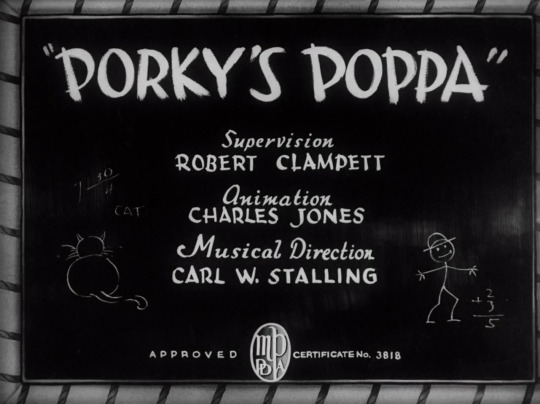
it’s safe to say that 1938 was porky’s best year. speaking in terms of solo cartoons, that is. his cartoons were genuinely funny, stimulating, and he looked great appearance wise. 1939 the porky burnout started, and he was slowly reduced to a smiling stock character whose adversaries and costars were much more alive than he was.
as daffy (and later bugs) rose to popularity, porky slipped into the sidekick role, paired primarily with the duck. with that said, the porky/daffy cartoons are some of the funniest around, and i firmly believe the best cartoons for the both of them are the ones where they’re paired together—with a few exceptions, of course.
however, let’s not get ahead of ourselves: a great year of pig stardom awaits. porky’s father, who made a few appearances during the joe dougherty era, makes his final return. in a story that has loose similarities to the premise of porky’s railroad, porky struggles to convince his father that their cow, bessie, is a much better fit for the farm than the newfangled mechanical cow his father has his eyes on.
the introduction is one of the funniest aspects of the cartoon itself. a hand erases the title credits, scrawled on a blackboard, and fills in ��PORKY’S POPPA... HAS A FARM”, mirroring the underscore of “old macdonald” (with substitute lyrics) below it.

a layout of the farm cuts to our pint-sized hero, grinning at the camera as the vocals sing “...and on this farm he had a pig: porky pig, you know.” bobe cannon animates porky struggling to sing along with the lyrics, his “oh buh-beh-boy!”s lagging with the beat. the music halts just in time for porky to pump his fists in frustration, not stuttering once as he grumbles “oh, skip it!”
repeatedly cutting back to the layout of the farm in conjunction with the lyrics is practically a gag within itself. the song grows increasingly absurd, with a goose honking horns, a cow showing off her legs as the vocals sing “with a little calf here, with a little calf there...”, struggling to keep up with the rapid pace of the song. bob clampett lends his own voice to a random duck (no relation to daffy!), following a hand pointing at certain areas of the farm and quacking (”with a little quack here, with a little quack there...”)
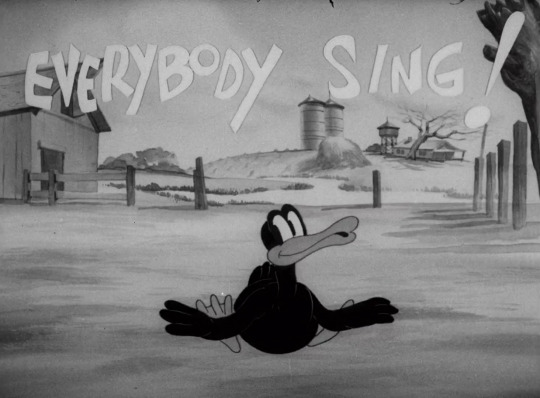
finally, the duck in his psuedo-donald duck voice instructs “EVERYBODY SING!”, complete with some fun and unique typography. the entire song falls to pieces--before, the cutting back to the farm’s layout added an incongruous feeling of calm to balance out the wacky antics of the animals and the song. now, everything happens at once. the duck zips across the screen in a quacking frenzy, the mother cow shows off her baby calves, thrusting them to the beat of the music, the goose is a one man band of assorted horns, etc. blissful chaos.
things slow down as we cut back to porky, who smugly whips out a phonograph behind his back. the record is just him saying “oh boy!”, playing correctly to the beat of the music. he’s got this song number figured out... or does he?
even technology can’t conceal his stutter. the record begins to skip, mimicking the sound of his stutter, and porky smashes the phonograph to pieces as he slams it against the ground. the wordless yet furious stare he gives the audience as the dying record croaks out a distorted “oooooooh..... boooooooooy....” is nothing short of priceless. though he didn’t say a word himself during this scene, his motives, thoughts, and emotions are clearly visible. you can FEEL his pride at his solution, as well of the subsequent fury of his solution blowing up in his face. a wonderful end to a hilarious song sequence.
“but on his farm, he has a mortgage... woe, oh woe, oh woe!” the score turns in to a mournful, minor key dirge, with anthropomorphic mortgage papers posing proudly on the farm. some very clever posing and metaphorical play as we fade to porky’s dad, moping around on the farm, the mortgage aligning with his silhouette and becoming a physical weight on his back. more playing with typography as the narrator reads aloud the words on the screen:
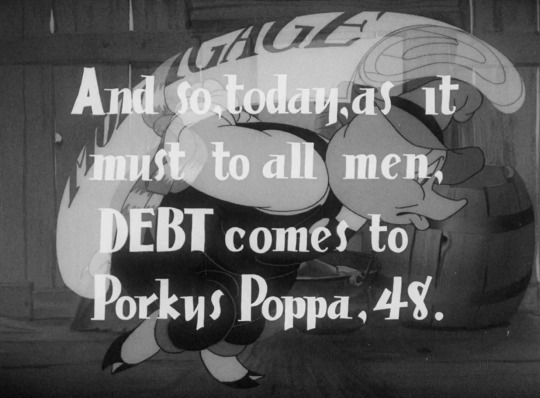
this is a parody of the march of time, a radio program who would often announce the death of a notorious person by declaring “and so, today, as it must to all men, death came to [name], [age].” even without the context, the gag is rather amusing, bringing a different change of pace to the cartoon with the addition of a narrator and the typography. knowing the source of the gag makes it hit just the right spot.
porky’s dad mutters about ruination, how he has no milk and no money, etc. mel blanc does a fine job of mimicking joe dougherty, maintaining the stutter and the low voice--in the dougherty cartoons, porky’s father was just dougherty’s natural speaking voice, whereas porky was sped up considerably. you can hear both at once here for comparison.
we pan over to the cause of one of these stresses: their cow, bessie, has been quarantined (how timely!) for “hoof ‘n mouth trouble”, a play on hand-foot-and-mouth disease. clampett opts to take things just a step further--we truck inside the stall to see bessie posing for the camera, grinning with her foot INSIDE her mouth, batting her eyelashes and all. the “bull bontana” (bull montana) poster plastered inside of her stall is a clever touch.
after seeing that bessie’s production chart has dipped overwhelmingly into the negatives--a roll of paper unfurling at porky’s father’s feet, indicating just how poor the farm is doing--he places an “out of order” sign on the stall door.
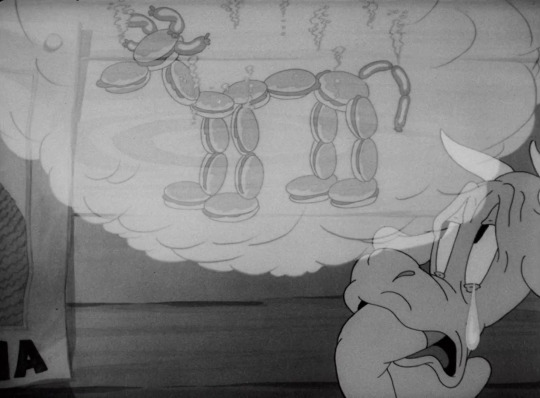
suddenly, porky’s father grows aggravated. “i need to send you to the hamburger factory!” cue a close-up of bessie tearfully picturing her fate--a pile of burgers and hotdogs make up her figure. clampett would reprise this gag (albeit in a much more cruel manner) in porky’s last stand 2 years later, where daffy eagerly envisions a steaming hot hamburger in place of an innocent little calf.
this is the second cartoon to make an ACME reference, the first being buddy’s bug hunt back in 1935. porky’s father phones up ACME mail order company, asking for “one cow--airmail”. context clues are just as important to the gag than the reveal itself: porky, his father, and bessie all become alert to the sounds of an airplane making a cacophony overhead. suddenly, a package bursts through the barn ceiling, floating to the ground with a neatly tied parachute. the animation appears to be the work of john carey, from the tall, pill-shaped eyes to the slow, drawn out way that porky blinks.

norm mccabe takes over to animate the grand reveal. lots of wonderful little subtleties: porky and his father are timed slightly differently, giving them both a natural sense of interaction and movement. there’s a lovely little accent on porky’s father opening the package by pulling a string--he jerks his head up slightly as he plucks the string, allowing the audience to feel the physical impact and snap of the pluck. it’s subtle, but very well done.
instead of a flesh and blood cow, a mechanical hunk of metal slowly unfurls to life as the package opens. as porky’s father reads the label (The New 1938 CREAMLINED COW), porky himself objects to the new addition. “aww, eh-the-there ain’t no such animal!”
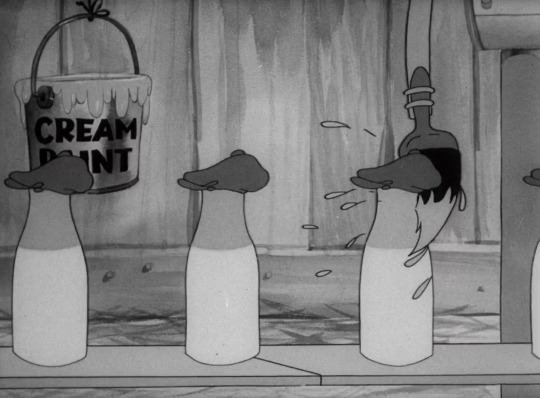
indeed there is: porky’s father loads a pile of hay into a chute, pressing down on the cow’s paintbrush tail. the cow pumps along to a brassy score of “old macdonald”, churning out milk from its metal udders, the milk pouring straight into an assembly line of bottles below. bob clampett’s puns are plentiful in this cartoon (notice how there’s no writer’s credit--he often said that he would write some of his earliest cartoons himself. i assume he wrote this one as well? i wonder how much input chuck jones had in the story?), but delivered nonchalantly, so they can actually be enjoyed. the cow caps the milk bottles by putting literal newsboy caps on top of the bottles, the paintbrush tail painting “cream paint” to the outside of the bottles and forming the illusion of cream. interesting business practices!
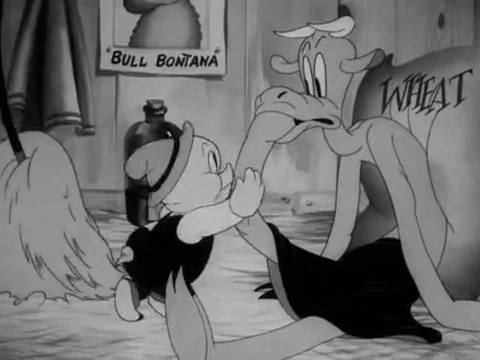
bobe cannon animates a delightful scene with porky. fun animation and fun dialogue make for a great combo. some very fluid, light, and fun animation of porky giving his pep talk as he hops around, swinging his arms, nonchalantly pushing his hat out of his face after getting so excited. “c’mon, eh-beh-beh-beh-bessie! we won’t let that old eh-neh-nuh-new fangled eh-ceh-co--heifer beat us. you just eat your uh-wuh-wee-weh-whea--eh-ha-hay, and show that eh-teh-eeh-eh-tin-can cow who can make the most...”
porky lowers bessie’s foot from her mouth by climbing on it, preparing to shovel a forkful of hay into her mouth, however, she shoves her foot right back in it, much to porky’s annoyance. “aww, every time you open your muh-mee-muh-me-eh-mou--kisser, ya put your eh-feh-eh-foot in it! eh-bee-bessie, you gotta eat! you eh-deh-dee-eh-don’t wanna be eh-seh-seeah-seeah-smothered in onions, eh-do ya?”
treg brown’s sound effects of doors creaking as her leg is lowered is the perfect touch to the gag. porky struggles to feed bessie, eventually getting stuck in her mouth himself as he attempts to hold both legs down to no avail. he frees himself, just in time to hatch an ingenious idea.
his plan works: porky places the entire pile of hay onto bessie’s legs, who swallows it up whole, her mouth comically huge as she attempts to swallow it. porky is overjoyed, clapping at her efforts before rushing off to give her some privacy.
instead of porky just milking her like a regular farmer, clampett pushes the entire scenario further. porky paces around in the manner of an expectant father, accompanied by a soft score of “lullaby on broadway”. the sound of a baby crying prompts porky to do a gorgeously animated head shake of surprise--bessie hands him a milk bottle, which porky carefully swaddles and places in a basket.
the charade continues, with clampett lulling us into a false sense of security with an already absurd gag. cue a gag that would have been incredibly risque in 1938: at about the fifth bottle, porky reaches out and finds that bessie hands him a bottle labeled “CHOC. MALT”, accompanied by an underscore of “i wish i was in dixie”. porky and bessie both grow bashful, but porky’s nonchalant whistling is cut to a half as bessie delivers yet another bottle. “gosh--eh-ceh-ceh-quin-eh-qui-eh--quart-tuplets!”
porky rushes over to his farther to share the good news. however, dad is too preoccupied with the fancy mechanics of the cow to pay bessie any mind. he shows porky a barrage of dairy-related puns churned out by the creamlined cow:
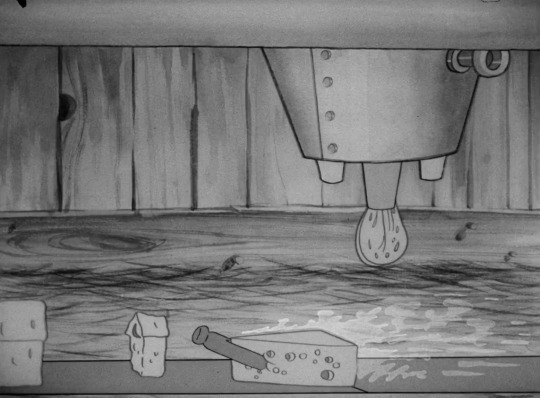
cottage cheese (cheese in the shapes of houses--and an outhouse for good measure--don the conveyer belt), limburger cheese (cheese slices with clothes pins pinned to their “noses” to ward off the stench), and swiss cheese (a cuckoo bird pops out of the cow’s mechanical side and sprays the cheese wheels with bullets, which turn into yodeling mouths). interestingly, mel’s voice for porky’s father changes in this scene--it’s still him, but the nasally undertones are absent. i wonder if he did this on a different day?

nevertheless, the staging of the next gag is genius. the majority of the screen is black, save for a small window revealing porky holding onto bessie’s udders. “c’mon, eh-beh-bessie! hurry eh... hurry eh... step on it!” the window expands to reveal bessie pouring a bucket of milk into a line of funnels (rather than udders), which are then evenly distributed to the bottles. “’ats a guh-geh-gee-eh-girl!”
mechanical cow seems to be doing just fine, plopping cherries on top of elaborate ice cream sundaes and milk shakes. the only fault in the system is the cow’s own personal whiskey bottle rolling down the assembly line, which it confiscates promptly.
porky, on the other hand, is making do. with an ice block on her head, bessie churns out ice cream cones to the best of her ability. as the cones grow smaller and smaller in size, porky orders her to eat more hay, which she happily does so.
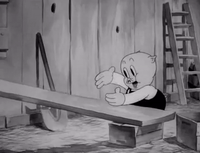
now, it’s cow vs. cow. the mechanical cow opts to play some dirty tricks on bessie, pouring a jar of vanishing cream it produced onto the hay bessie is eating. and, thanks to the law of cartoon physics, the milk bottles she hands porky disappear by the minute. though the effect of the bottles disappearing may not seem like much today, for 1938 the ink and paint department did a wonderful job of demonstrating the illusion that the bottles suddenly disappeared.

with the rest of the hay now gone thanks to a hefty glob of vanishing cream, porky and bessie engage in a wild goose (cow?) chase to find more hay. the mechanical cow gobbles up every square inch of hay in sight--at one point, bessie heaves a dubious shrug to the audience. i love how they made her hooves look like hands, but still remain identifiable hooves. the scramble animation she does as she dashes out of frame (with porky clinging to her like a horse) is wonderfully done as well.
both porky and bessie and the creamlined cow exit the barn, chasing each other around the farm. the mechanical cow physically turns into a vacuum cleaner, threatening to suck up the last remaining pile of hay. in a gag that’s reminiscent of the harman-ising days (is it the inclusion of the outhouse?), the cow-turned-vacuum rushes into a shed filled to the brim with hay. the audience merely watches the shed itself shrink in size as the cow gobbles up all of the hay, the final result a puny little outhouse.
at last, the enemies reach a face-off. the last pile of hay--or, as porky puts it in his punny little way, “eh-thee-the-thee-that’s the last straw.” in a relatively tashlin-esque maneuver, clampett makes some fast cuts to heighten the suspense of the action. cut between porky and bessie to the mechanical cow to the pile of straw (facetiously labeled “MILK WEED”). the cuts grow quicker and quicker, the music crescendo-ing...
until BLAM! in a loose parallel to the finale of rover’s rival, everything explodes at once. nuts and bolts rain in the sky, as do neat little bundles of hay. however, clampett doesn’t allow the audience to rest just yet--with bessie nowhere in sight, the mechanical cow continues to charge forth, seeking refuge in a hay to release a humongous pile of milk bottles. so high, in fact, that the shed (and cow) are elevated several feet into the air. porky’s a goner.
porky’s father, who had been absent for the past few minutes, reappears to declare the tin-can cow a winner, much to porky’s visible dissatisfaction.
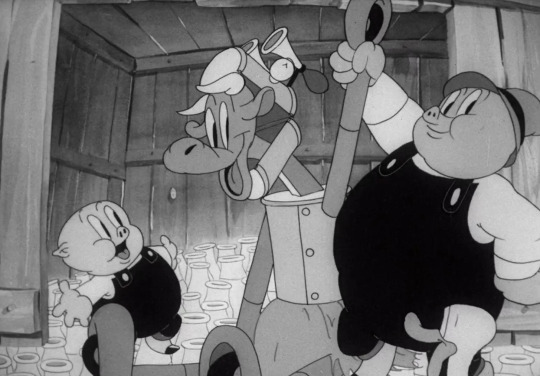
yet it’s not a clampett cartoon without a twist! bessie pokes her head out of the mechanical cow’s mouth, mooing the ever popular catchphrase from the ken murray show: “mmmmmmwooooooooooah, yeeeeaaaaaah!” porky gives a celebratory “oh, boy!” as we iris out--the goose and duck from earlier poke their heads into the scene just before the iris fully closes.
this is an early porky cartoon that’s just plain fun. bobe cannon’s animation of porky serves as one of the many highlights, from porky getting aggravated with his phonograph to his excited pep talk towards bessie. corny as the opening number is, it’s a lot of fun at the same time--the intensity in increasing chaos is a prevalent theme to clampett’s cartoons. just look at the climax/ending of baby bottleneck!
i don’t have many complaints towards this cartoon, if any at all. it’s not my favorite porky entry, sure, but it’s most certainly an enjoyable watch and one of his better cartoons of the ‘30s. the visual puns aren’t nearly as hamfisted as ben hardaway’s (as we’ll soon discover), making them more enjoyable than some of the jokes present in, say, daffy duck & egghead. regardless, there are a lot of unique gags, fun animation, and amusing dialogue to constitute a watch.
the cartoon is up on HBOmax, but you can also watch it here!
26 notes
·
View notes